#words can have completely different meanings depending on context
Explore tagged Tumblr posts
Text
Streamer 🌸 who's decently popular because they give practical, low-cost cooking lessons while being cute.
🌸: "Today we're going to make a healthy dinner using common leftovers!"
Anonymous4791638 superchatted $1000: "You are simply breathtaking, my darling. May I come over to your place tonight? I wish to give you a blessing of love."
...
You've been kicked out of U-chan's livestream.
🐉: "What has happened? How do I view their 'profile' again..? Let's see..."
You've been blocked by U-chan.
🐉: "..."
He was blocked and reported for being a creep. When he confronts 🌸 about it, they apologize and unblock him, but not without a stern warning.
🌸: "Why are you going around randomly giving $1000, sending thirst comments--"
🐉: "What is a thirst comment?"
🌸: "Unwanted compliments."
🐉, shocked: "You do not appreciate my compliments?"
🌸: "I didn't know it was you. Your account name is literally Anonymous4791638. How would you feel if a complete stranger threatened that they'd barge into your house at night and 'give you blessings of love'?"
🐉, scoffing: "I'd like to see them try to get past my lightning arrows first."
🌸: "Well I can't do that for myself. See?"
🐉: "... I'm sorry."
🌸: "Just don't scare people like that again... And, well. Don't you throw cash at me like that next time. Just come over anytime. We could even stream cooking lessons together~"
🐉: "I would appreciate that."
He stays over for a bit more as 🌸 helps him change his name to MDGargoyleEnthusiast instead.
#words can have completely different meanings depending on context#and mal's a frequent victim of that lmao#clueless old man#twisted wonderland#ventique rambles#malleus draconia#malleus x reader
827 notes
·
View notes
Text
I feel like a fucking idiot.
I'm part chinese, I know the vaguest amount of chinese, I've even taken mandarin classes throughout my life...
Yet somehow, somehow, I failed to realize that PM (may have) made a double-meaning joke with the 'hong' in Hong Lu's name meaning 'red'
#void screaming#limbus company#mandarin is a... strange-ish language#i say this because its syllables are very limited#meaning that a single word can mean a dozen different things#so it's heavily dependent on context#it's easier to tell in writing though#since those words (while still sounding the same) will have different ways of writing (hanzi)#hóngsè (red the color; 红色) and hóng lù (grand jade (according to google); 鸿璐) have different hanzi for the 'hong' portion of their words#but they still have the same tone signal (second tone; ó)#so technically#without proper context you could interchange both words for each other#and this may or may not tie back to how hong lu's source is called 'dream of the red chamber'#and it may also tie into how his base e.g.o. is him chucking a red ribbon at his enemies#(i feel like i'm completely off the mark here but like fuck it)#(food for thought wahoooooo)#hong lu lcb
16 notes
·
View notes
Text
You know what, I think it would be extremely funny if the tf2 mercs sometimes just casually called each other 'girl' the way gossipy teenage besties would. Especially mid conversation for no reason like:
"Girl, for the last time stop antagonizing the enemy Sniper during cease fire, this is the fifth time I've had to pull an arrow out of you and it's only 10am"
Do you- do you see what I'm trying to say, do you understand my vision rn
#In my perfect world Soldier calls everyone girl but insists on being the only one called woman because girls are for un-american sissies#tf2#team fortress two#i mean 'girl' in a completely gender ambiguous way btw- like how you would call your sister or girl besties 'bro' or smth#to me 'girl' is like- amagical word that can convey any emotion depending on your intonation and context#fav word tbh#like 'GIRL-' and 'girl-' have two different meanings#DO YOU SEE WHAT IM TRYING TO GET AT HERE??#THIS ISNT OFFENSIVE RIGHT#AM I REINFORCING A STEREOTYPE OR SMTH#silly chatters
35 notes
·
View notes
Text
Writing Notes: Children's Dialogue
Language is extremely complex, yet children already know most of the grammar of their native language(s) before they are 5 years old.
BABBLING
Babbling begins at about 6 months and is considered the earliest stage of language acquisition
By 1 year babbles are composed only of the phonemes used in the language(s) they hear
Deaf babies babble with their hands like hearing babies babble using sounds
FIRST WORDS
After the age of one, children figure out that sounds are related to meanings and start to produce their first words
Usually children go through a holophrastic stage, where their one-word utterances may convey more meaning
Example: "Up" is used to indicate something in the sky or to mean “pick me up”
Most common first words (among the first 10 words uttered in many languages): “mommy,” “daddy,” “woof woof,” “no,” “bye,” “hi,” “yes,” “vroom,” “ball” and “banana”
WORD MEANINGS
When learning words, children often overextend a word’s meaning
Example: Using the word dog to refer to any furry, four-legged animal (overextensions tend to be based on shape, size, or texture, but never color)
They may also underextend a word’s meaning
Example: Using the word dog to refer only to the family pet, as if dog were a proper noun
The Whole Object Principle: When a child learns a new word, (s)he is likely to interpret the word to refer to a whole object rather than one of its parts
SYNTAX
At about two years of age, children start to put words together to form two-word utterances
The intonation contour extends over the two words as a unit, and the two-word utterances can convey a range of meanings:
Example: "mommy sock" = subject + object or possessive
NOTE: Chronological age is NOT a good measure of linguistic development due to individual differences, so instead linguists use the child’s mean length of utterance (MLU) to measure development
The telegraphic stage describes a phase when children tend to omit function morphemes such as articles, subject pronouns, auxiliaries, and verbal inflection
Examples: "He play little tune" or "Andrew want that"
Between 2;6 and 3;6 a language explosion occurs and children undergo rapid development
By the age of 3, most children consistently use function morphemes and can produce complex syntactic structures:
Examples: "He was stuck and I got him out" / "It’s too early for us to eat"
After 3;6 children can produce wh-questions, and relative pronouns
Sometime after 4;0 children have acquired most of the adult syntactic competence
PRAGMATICS
Deixis: Children often have problems with the shifting reference of pronouns
Children may refer to themselves as "you"
Problems with the context-dependent nature of deictic words: Children often assume the hearer knows who s/he is talking about
AUXILIARIES
In the telegraphic stage, children often omit auxiliaries from their speech but can form questions (with rising intonation) and negative sentences
Examples: "I ride train?" / "I not like this book"
As children acquire auxiliaries in questions and negative sentences, they generally use them correctly
SIGNED LANGUAGES
Deaf babies acquire sign language in the same way that hearing babies acquire spoken language: babbling, holophrastic stage, telegraphic stage
When deaf babies are not exposed to sign language, they will create their own signs, complete with systematic rules
IMITATION, REINFORCEMENT, ANALOGY
Children do imitate the speech heard around them to a certain extent, but language acquisition goes beyond imitation
Children produce utterances that they never hear from adults around them, such as "holded" or "tooths"
Children cannot imitate adults fully while acquiring grammar
Example:
Adult: "Where can I put them?" Child: "Where I can put them?"
Children who develop the ability to speak later in their childhood can understand the language spoken around them even if they cannot imitate it
NOTE: Children May Resist Correction
Example: Cazden (1972) (observation attributed to Jean Berko Gleason) – My teacher holded the baby rabbits and we patted them. – Did you say your teacher held the baby rabbits? – Yes. – What did you say she did? – She holded the baby rabbits and we patted them. – Did you say she held them tightly? – No, she holded them loosely.
Another theory asserts that children hear a sentence and then use it as a model to form other sentences by analogy
But while analogy may work in some situations, certainly not in all situations:
– I painted a red barn. – I painted a barn red. – I saw a red barn. – I saw a barn red.
Children never make mistakes of this kind based on analogy which shows that they understand structure dependency at a very young age
BIRTH ORDER
Children’s birth order may affect their speech.
Firstborns often speak earlier than later-born children, most likely because they get more one-on-one attention from parents.
They favor different words than their siblings.
Whereas firstborns gabble on about animals and favorite colors, the rest of the pack cut to the chase with “brother,” “sister,” “hate” and such treats as “candy,” “popsicles” and “donuts.”
The social dynamics of siblings, it would appear, prime their vocabularies for a reality different than the firstborns’ idyllic world of sheep, owls, the green of the earth and the blue of the sky.
MOTHER'S LEVEL OF EDUCATION
Children may adopt vocabulary quite differently depending on their mother’s level of education.
In American English, among the words disproportionately favored by the children of mothers who have not completed secondary education are: “so,” “walker,” “gum,” “candy,” “each,” “could,” “wish,” “but,” “penny” and “be” (ordered starting with the highest frequency).
The words favored by the children of mothers in the “college and above” category are: “sheep,” “giraffe,” “cockadoodledoo,” “quack quack,” the babysitter’s name, “gentle,” “owl,” “zebra,” “play dough” and “mittens.”
BOYS / GIRLS
One area of remarkable consistency across language groups is the degree to which the language of children is gendered.
The words more likely to be used by American girls than by boys are: “dress,” “vagina,” “tights,” “doll,” “necklace,” “pretty,” “underpants,” “purse,” “girl” and “sweater.”
Whereas those favored by boys are “penis,” “vroom,” “tractor,” “truck,” “hammer,” “bat,” “dump,” “firetruck,” “police” and “motorcycle.”
Tips for Writing Children's Dialogue (compiled from various sources cited below):
Milestones - The dialogue you write should be consistent with the child's developmental milestones for their age. Of course, other factors should be considered such as if the child has any speech or intellectual difficulties. Also note that developmental milestones are not set in stone and each child is unique in their own way.
Too "Cutesy" - If your child characters are going to be cute, they must be cute naturally through the force of their personality, not because the entire purpose of their existence is to be adorable.
Too Wise - It’s true kids have the benefit of seeing some situations a little more objectively than adults. But when they start calmly and unwittingly spouting all the answers, the results often seem more clichéd and convenient than impressive or ironic.
Unintelligent - Don’t confuse a child’s lack of experience with lack of intelligence.
Baby Talk - Don’t make a habit of letting them misuse words. Children are more intelligent than most people think.
Unique Individuals - Adults often tend to lump all children into a single category: cute, small, loud, and occasionally annoying. Look beyond the stereotype.
Personal Goals - The single ingredient that transforms someone from a static character to a dynamic character is a goal. It can be easy to forget kids also have goals. Kids are arguably even more defined by their goals than are adults. Kids want something every waking minute. Their entire existence is wrapped up in wanting something and figuring out how to get it.
Don't Forget your Character IS a Child - Most of the pitfalls in how to write child characters have to do with making them too simplistic and childish. But don’t fall into the opposite trap either: don’t create child characters who are essentially adults in little bodies.
Your Personal Observation - To write dialogue that truly sounds like it could come from a child, start by being an attentive listener. Spend time around children and observe how they interact with their peers and adults. You can also study other pieces of media that show/write about children's behaviour (e.g., documentaries, films, TV shows, even other written works like novels and scripts).
Context - The context in which children speak is crucial to creating realistic dialogue. Consider their environment, who they're speaking to, and what's happening around them. Dialogue can change drastically depending on whether a child is talking to a friend, a parent, or a teacher. Additionally, children's language can be influenced by their cultural background, family dynamics, and personal experiences. Make sure the context informs the dialogue, lending credibility to your characters' voices.
Sources and other related articles: 1 2 3 4 5 6 7 8 9 10
Writing Notes: On Children ⚜ Childhood Bilingualism More: Writing Notes & References ⚜ Writing Resources PDFs
#writing prompt#writeblr#writers on tumblr#spilled ink#poets on tumblr#writing notes#children#writing tips#literature#writing advice#writing reference#studyblr#langblr#linguistics#dark academia#dialogue#writing resources
4K notes
·
View notes
Text
So... What Does an Editor Actually Do?
First off, “editor” is one of those words that causes a lot of confusion for writers. It seems simple—someone who works with words, right? But the truth is, “editor” can mean wildly different things depending on the context.
So, let’s clear things up.
When we’re talking about writing and publishing, “editor” usually refers to one of two roles:
1. The Gatekeeper: This is the person who commissions or selects work for a publication, like a magazine, newspaper, or publishing house. Think of phrases like “Her book was chosen by the editor at [Big Fancy Publisher].”
2. The Helper: This is the person who works directly with writers to improve their work. They might suggest revisions, clarify ideas, and polish the manuscript for grammar and style.
Both are called “editors,” but their jobs are completely different. To make things more confusing, in smaller operations (like indie presses), these roles often overlap. The same editor might choose your story for publication and offer stylistic or copyedits before it goes to print.
The 4 Types of Editing
Beyond the word “editor,” the types of editing writers encounter also vary widely, further boggling the mind. Here’s a quick breakdown of the four main types of editing your manuscript might go through:
1. Developmental Editing
This is the kind of editing I do, and the kinds of issues that are covered by the majority of my blog posts. Developmental editing:
• Focuses on the “big picture” of your story—plot, character, pacing, worldbuilding, and structure.
• Asks questions like: Does the ending make sense? Are the characters believable? Is the story too slow?
• This is the most intensive (and expensive) type of editing because it shapes the foundation of your book.
2. Stylistic Editing (Line Editing)
I don't do this kind of editing for my clients, but I occasionally publish line editing tips on this blog because I'm kind of a nerd about it :) Line editing:
• Works on clarity and flow at the sentence and paragraph level.
• Addresses repetition, awkward phrasing, and other issues that muck up your writing flow.
• Happens after developmental editing—no point polishing a scene if it might get cut!
3. Copy Editing
Once in a while I give copy editing tips on this blog, but they're usually wrong and I'm promptly corrected. Let it be known: The Literary Architect is a terrible copy editor. Copy editing:
• Focuses on technical details like spelling, grammar, punctuation, and consistency (e.g., making sure a character’s blue eyes don’t randomly turn brown).
• Think of this as quality control for your manuscript.
4. Proofreading
• The very last step before publication. The proofreader checks for any typos or layout issues that might have slipped through the cracks.
Whether you’re submitting to a publisher or self-publishing, editing matters. Great stories get rejected because they weren’t polished enough. And self-published books that skip editing often lose readers due to glaring errors or clunky prose.
If hiring a professional editor isn’t in the cards, learning to self-edit can help you get your manuscript into the best possible shape before publication. That way, if you do decide to bring in an editor later, they can focus on the deeper work instead of fixing things you could have tackled yourself.
Hope this helps!
/ / / / / / / / / / /
@theliteraryarchitect is a writing advice blog run by me, Bucket Siler, a writer and developmental editor. For more writing help, download my Free Resource Library for Fiction Writers, join my email list, or check out my book The Complete Guide to Self-Editing for Fiction Writers.
#writeblr#writing advice#writing tips#fiction#writers on tumblr#writers#editing#editing advice#from the editor's desk
146 notes
·
View notes
Text
Snippets. 🐺💜
For Game Informer’s July 17th DA:TV article, "BioWare On Returning To The Dragon Age Series, 10 Years After Inquisition", the article is still titled as such on its own page, but it looks like on the GI DA:TV Hub page its listing was updated to "Dragon Age: The Veilguard Is 'Respectful And Referential' To Previous Games Without Making Them Mandatory"
[previous comment for context - Brenon: "we do have "decision saves" before big choice moments, but there are still a bunch that depend on a whole mess of stuff you've done earler...so yeah...RIP"]. Derek on this: "Choice and consequence, baby." [source]
[context: DA official Twitter's news about what's coming in August] Derek: "Buckle up!" [source]
Bryony Corrigan (Rook) on the strike: "I care a lot about this game! @/dragonage. Gutted we are unable to speak more about the game for now but absolutely in solidarity with actors in the US. I hope @/EquityUK are also fighting for better protection against AI clauses in the UK too…!" [source]
Matt Rhodes recently wrote to his mailing list that "The project I’ve been working on for many years is nearing completion. In my rare free moments, I’ve been starting to organize concept art to start posting after the game ships." [source] So it sounds like DA:TV is nearing completion and that he will be posting DA:TV concept art that he created after release. [This] is the link to his website where you can view his art, including some existing DA:TV and previous DA game concept art. If you click the envelope symbol on this page, that's how you can subscribe to the mailing list
from Community Councilmember Ladyinsanity - Lucanis x Rook apparently might be an "angst pairing" and there's maybe another one of these in the game also...? 👀 [source]
A user mentioned that they aren't keen on the word "roadmap". Michael Gamble explained: "all it means is a list of cool things you can expect to see us showing." [source]
Bellara's family name Lutare wasn't recently changed as some users wondered, it was Lutare at least a year ago during development. It seems it was just mis-printed or mis-reported in the GI coverage [source]
This article describes DA:TV as the most beautiful game the writer saw at SGF. It says the prologue is dated 9 years after DA:I. "Varric isn’t a ginger so much as a grizzled gray fox now". On Solas, he "wants to tear down the Veil that separates Thedas from the world of demons, restoring his people’s immortality and glory and sacrificing thousands in the process. But when his ritual goes awry, two of his most ancient and powerful adversaries are released. They seek only to finish what they started millennia ago – the complete and utter domination of our world." The game moves quite seamlessly from action to cutscene, and in the prologue "every cutscene is clearly building toward something larger". Position matters in combat. There is an accessibility option which involves the path-tracing of enemies' ranged attacks. At the beginning of the demo, the devs mentioned that they thought about the way different lighting affects your character. " The animations associated with combat are complex for one reason: responsive character features." CC has "inclusion of thick curly hair and capturing the tightly curled texture of Black hairstyles and natural hair", customizable shoulder-width and "a much-welcomed broad spectrum of skin tones—capturing both cool and warm undertones of both white and brown skin". The article highlighted the fluid movement of cloth. The writer also said, "I’m sure other Summer Game Fest previews will have a lot to say on the evolving relationship between Varric and Solas". [source] ((I don't remember seeing this article til now, it's from June though so I either missed it or have seen it and forgotten. also I don't know how accurate it is but the writer was one of the attendees of the DA:TV demo at SGF))
[character limit text break!]
Malcolm: "When I joined DA:Ve I was really hoping there'd be a romanceable dwarf companion and boy howdy did that come true. Harding is ☀️delightful☀️" [source]
[context: this Tumblr post of some neat art] Malcolm: "This is amazing and I fully went "oh wow that really sounds like Emmrich" before remembering that Nick Boraine is in fact a entire human person." [source]
User: "Speaking of Stalker, as a player the description of Bellara and Veil Jumper i've heard so far, alongside their exploration of Arlathan, somehow reminds me of Clear Sky and Chornobyl in Stalker series..." John Epler: "great eye! roadside picnic, Annihilation and STALKER were all absolutely inspirations" [source]
John Epler: "time to slowly make my way home after an awesome 4 days. thanks for an amazing experience to everyone who was a part of it. back to work." [source]
User: "We know there are returning characters in The Veilguard, so my question is: How would you and the rest of the writers go about writing a returning character who was originally primarily written by a writer who is no longer at the studio? What is the process?" Trick Weekes: "1. Watch videos to get the performance, how the character speaks. 2. Don’t try to replicate the character exactly. Allow them to have grown. Morrigan in DAI wasn’t Morrigan in DAO. She’d grown up. 3. Trust Character Art and Performance/VO. As soon as Morrigan walks in and talks in DAI, it works." [source]
Ali Hillis (Harding) on Twitter: "@dragonage @/bioware @/BioWarePulse @/ea #/DragonAge #/SDCC #/SDCC2024 FOLLOW ON INSTA FOR MORE!" [source]
Alex Jordan (Rook): "To all the D&D loving Dragon Age fans out there, let me tell you about my D&D group, made up of faces from the games industry! Including the voices of Geralt from The Witcher, Clive from Final Fantasy XVI, and Noah from Xenoblade! We are @/NaturalSix #/DragonAge" [source]
Erika Ishii (Rook): "Grateful I got to spend SDCC celebrating my roles in 2 games I love. Thank you to the devs (including laid-off workers who deserve full credit!), my friends, and the community. This is the last you’ll hear from me about my games from struck companies until they sign an interim agreement or the strike is won. Keep playing games, but share info from the union and let people know we’re taking a stand for all creatives. See you on the other side! ✊🏼🎮" [source]
Jeff Berg (Rook): "Damn, I love making video games. It’s like the perfect blending of theatre on film, where an actor is encouraged to collaborate and let their imaginations soar. And damn, do I ever love the incredible support from the fans of this incredible medium. Unfortunately, we’re in a time of upheaval in the industry. So let me make it perfectly clear: Video game performers deserve fair wages, safe working conditions and A.I. protections. I call on the employers to #/LevelUpTheContract. Guys, this is no single player game. We need you on our team. #/SagAftraStrong #/VideoGameStrike". Text in the accompanying video reads “Video game performers are stuck in a grind. AI is stealing voices, and companies are hoarding profits. The future of voiceover and performance capture artists is at stake. But out fight isn’t single-player. Whether you’re a gamer, a fan, a performer, a labor ally, or just someone believes in fairness. Keep video games people powered. We need you on our team. Video game companies must offer AI protections to ALL video game performers. Join me and show your support for those who bring our favorite games to life.” [source]
Jessica Clark (Neve): "Aaah a true bucket list moment!! Thrilled to play Neve Gallus a Private Investigator & one of the companions in the upcoming DragonAge The Veilguard Video Game!! We are appearing at the San Diego Comic Con as we speak!! With so much thanks & appreciation for the most fantastic team @/bioware & inspiring fellow cast members including (not limited to) @/missalihillis @/nickboraine @/zach.mendez @/jeffberg1 & more 🙏🏽 Draon Age The Veilguard releases this Fall 2024 & from what I've seen... It's truly epic!! You will love it & yes, it's worth the wait. (SAG-AFTRA issued us a specific window to promote & celebrate at Comic Con & from Sunday night onwards we will all be joining our fellow actors in the picket line for the Video Game Strike)." Text in the accompanying video reads "I’ve wanted to share this for so long! Thrilled to reveal that I play Neve Gallus in the upcoming Dragon Age The Veilguard!! Appearing at Comic Con San Diego as we speak” [source]

[source]
Jessica: "Last night's Comic Con San Diego's Fandom red carpet celebrating Dragon Age The Veilguard! Releasing this Fall 2024!!" [source]
Zach Mendez (Lucanis): "A truly amazing first day of SD Comic Con at the @/dragonagegame poster signing at @/darkhorsecomics booth. Thank you to the fans who made my first con unforgettable #/sdcc /#sdcomiccon #/dragonage #/darkhorsecomics #/lucanisdellamorte #/voiceacting #/bioware #/eagames #/theveilguard #/babysfirstcon" [source]
Zach: "Dragon Age. Dancing. Derulo. Thanks @/fandom for a killer party" [source]
Nick Boraine (Emmrich): "Thank you @/bioware @/ea and @/comic_con - had an incredible time! #/dragonage #/theveilgaurd #/emmrichvolkarin @/zach.mendez @/missalihillis @/thejessicaroseclark - can’t wait for the fall release date." [source]
Ali: "Honored and thrilled to have been a part of another epic @/bioware story w @/ea . Thanks from the bottom of my heart to the whole team! We worked hard, and put our all into this one. Can’t wait to see you all at #/sdcc2024 this week to celebrate @/dragonagegame #/dragonageveilguard" [source]
Ali: "1st day of San Diego Comic Con 2024 !! The lines were long and the signings so much fun! Met some really nice fans, hung out w dragon age performance director @/ashley___barlow , companions @/thejessicaroseclark @/zach.mendez & Nick Boraine . So SO grateful for this #/dragonageveilguard family!" [source]
Ali: "I love every one of these people. There, I said it! What a warm welcome we received! Thanks to ALL! For EVERYTHING!" [source]
Ali on SDCC: "Gooooooood times. ❤️" [source]
Here is a 'behind the scenes at the DA:TV SDCC panel' photo -
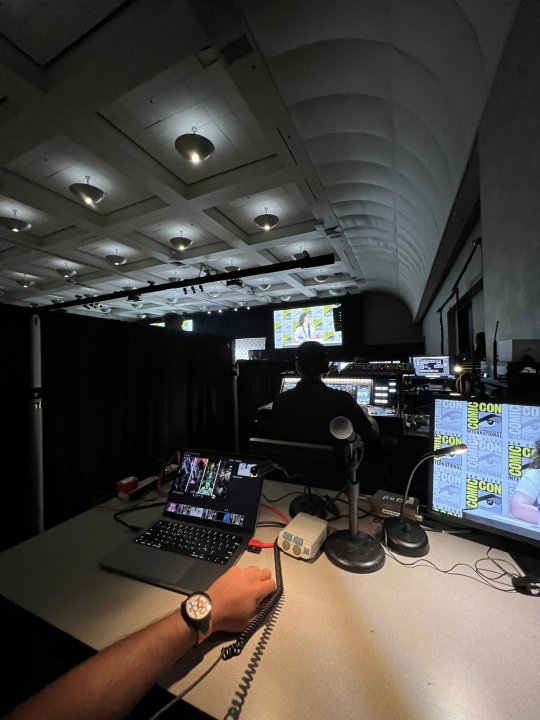
[source]
Here is a photo of Erika Ishii with Rook's blue knife -
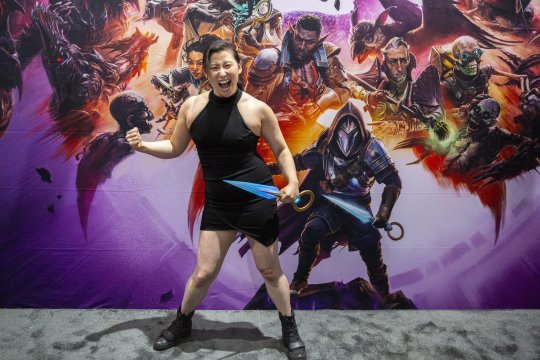
[source]
Here is an excerpt from Brianne Battye's website:

Text reads: "Dragon Age: The Veilguard Defy the gods. Rise as Rook, Dragon Age’s newest hero. Be who you want to be and play how you want to play as you fight back and lead your team of seven companions, each with their own rich story. Together, you will become the Veilguard. Coming soon From EA/BioWare. I was responsible for a companion story arc, significant side characters, faction content, exploration content, and helping develop and expand worldbuilding lore."
[source]
Also, last year Zach Mendez (Lucanis) made a prior podcast appearance:
Zach: "I was lucky enough over the pandemic to have just hit a really nice commercial, and then I got this beautiful job on a video game where I was doing motion capture. Motion capture? Okay, so you put on this leotard, this black suit, and those little dots on, and you do all the motion for a video game, and you get to do the voice, and they put all these black lines on your face, so they capture your performance and whatnot. And so I was doing that and had some commercial money, so throughout the pandemic, for the past few years, I’ve just been getting to live off acting, which is great." -- Zach: "[Voiceover is] what I'm working on right now." -- Zach: "My father's from Spain." -- Zach: "I'm currently working on a video game, I can't say which video game." "It is a big one, it's not a big deal, it's a big one, I'm one of the main characters, it's not that big a deal." The interviewer asked about how acting in video games works. "Somebody's giving some performance that of course, they layer on imaging afterwards, like in graphics, right? But you're giving facial expressions, that's what gives it the reality, that's what I find so fascinating about motion capture, is that, you get to give big performances, because you're playing these crazy characters in crazy situations, and a lot of your performance is coming through in the final product which is, just gets me excited about the future of things about all the different ways. It's my voice, a lot of my facial features, I voice, I think, one or two characters in this game."
[source (dated ~a year ago. source link isn’t work-appropriate. I don’t recommend the podcast)]
#dragon age: the veilguard#dragon age the veilguard spoilers#dragon age: dreadwolf#dragon age 4#the dread wolf rises#da4#dragon age#morrigan#queen of my heart#solas#bioware#video games#long post#longpost#covid mention#first bullet point was mentioned to me by the-rebel-archivist#ty!#k#(actor soc media posts from before strike began)
205 notes
·
View notes
Text
Twst Characters and "you" (pt1)
(Many thank-yous to @/irafuwas for so much help with this post!)
The Japanese language has numerous words for “you,” which vary by person and situation.
君 / キミ (kimi) is a casual form of “you” that isn’t overtly rude, but can sound condescending in certain contexts and isn’t appropriate to use in formal settings or when talking to superiors. It’s very common in pop culture (music/anime/etc.), and depending on the situation, it can imply closeness or emphasize the authority of the speaker, such as superiors using it with their subordinates in certain academic or professional settings.
Q: “So it can either imply the speaker is pretty close with the person they’re talking to, or even something totally different--that the speaker’s trying to assert their authority? And it’s used not only in love songs, but also by teachers to address their students? Basically, the meaning can change completely even though it’s the same word?”
A: Yes! The Japanese language’s various “you”s are extremely context dependent! (If you are a language learner, the safest bet will always be just using a person’s name with an honorific! The honorifics used by the various characters of Twst have been compiled here)


キミ (kimi) is the form that Riddle uses most, often with the non-housewarden students who are in or below his grade.
Trey uses 君 (kimi) with the dwarves in Book 5 as well as with Jamil and Jade, both during vignettes that are hinted at taking place at the very beginning of the school year, so it’s possible that he wasn’t very familiar with them at the time.


君 (kimi) is the main form of “you” used by Cater, with two exceptions: once with Trey, and once to thank the first-years for their help in handling Riddle in a whispered comment that the others don’t seem to hear (this doesn’t include his ghost possession during Spectral Soiree).
Deuce uses 君 (kimi) upon meeting Ace, Chenya, and Epel for the first time as well as three other forms of “you.”


Ruggie shifts between two forms of “you,” and 君 (kimi) is one of them.
Azul uses three forms of “you” including 君 (kimi), Jamil uses 君 (kimi) plus four other forms of “you”, and it is possible that Rook uses キミ (kimi) almost exclusively (with at least two exceptions, both in Book 6).



Epel uses 君 / キミ (kimi) in both kanji and katakana.
Idia also seems to use 君 (kimi) very often, also with two exceptions (Ortho and human-Ortho).
Ortho also seems to use 君 (kimi) almost exclusively, also with two exceptions (Idia and Malleus).


君 (kimi) is also how the Dawn Knight addresses Silver, and is the form of “you” that Rollo uses for the first half of Glorious Masquerade (he rotates through three different forms in total).
It’s also used by Vil’s father Eric and is one of four different forms of “you” used by Fellow.




92 notes
·
View notes
Note
i love ur aus! your interpretations of the relationship dynamics in new ways that still feels true to the characters is really cool- take supernatural crazy stuff and making it fit in a more normal dynamic can't be easy.
do you have any opinions on how sukuna or choso get along with wasuke? (and do sukuna + choso both privately think of themselves as The Oldest Brother, or is one of them a middle brother?)
hey!!! thank you for sending this. i take it as a really big compliment ! i get very particular about that kind of thing so i'm glad it reads the way i want it to.
i'll answer this in the context of my aus. depending on the au there are minor differences though! and i hope you don't mind if i yap a little bit under the cut!
the most important part of this question is how wasuke's personality would mesh with them respectively so it's important to first consider what type of person wasuke is and how he would engage each of them. besides his appearances in the manga/anime we can deduce some of his personality through yuuji (how he was raised, his conduct, etc).
wasuke seems to be very even-tempered, family-focused so i think choso would get along the most with wasuke. choso is very gentle at heart and also family-oriented himself so wasuke would think highly of choso who is very outrightly passionate about it. wasuke himself doesn't seem to be overly affectionate physically or verbally but we know that he cared deeply for yuuji. choso being sort of the opposite way complements him well, at least in the context of caring for yuuji and i see him appreciating choso for making up for perhaps what he would consider his own limitations. wasuke would probably find it embarrassing but as a grandfather who loves his family he would be grateful for having choso in their lives.
sukuna and wasuke would clash more but not to the point where there is any real tension. i think they would bicker a lot, but only because they both seem like the stubborn type....probably share other personality traits too...idk..i feel it in my bones (and tbh in normal peoples au sukuna had a weird edgy phase where wasuke found him cringe af and he never let sukuna live it down 😭). in unckuna au and 12 years au they would both be very involved in rearing yuuji so they'd have long discussions about things after yuuji went to bed or something so this gives them a purpose to get along. not saying that sukuna wouldn't get along with him but to be completely honest sukuna is not the type of character to really care about much beyond himself. so they're like coworkers........but the work is yuuji. sukuna would respect wasuke out of principle (principle being he is an elder, he is his father/grandfather) and wasuke expects that from him, the end.
but knowing people like wasuke, neither of them are getting praise from him no matter how well they do or how much they impress him lol. he will tell them off immediately if they do anything wrong, and is not the type to say pretty words. if he wants to be nice to them he'll probably show it through action though; he'll go out of his way to buy their favourite fruit ("i got x today at the market, peel/cut them up for us"), drink tea and have snacks in the same room instead of sitting on the porch alone, things like that.
about the birth order...i think that's complicated. in normal peoples au i usually consider choso the oldest by a couple years (kaori's child from a past marriage or an ex). if it's the cousin choso au (where kenjaku is kaori's brother) he's around the same age as sukuna give or take. in sorceror au where he is a death painting choso is the oldest by far but sukuna won't acknowledge him as family for reasons (usually infantile and superficial) 😭😭😭.
in most aus sukuna kind of looks down on him for not looking like them and/or for not being human, and in most aus choso is not interested in sukuna beyond asking him to stop being mean to yuuji. almost writing off sukuna as yuuji's brother at all. almost... if it's any uncle au it's harder for him to ignore that i think...choso respects his elders...unfortunately...(he secretly thinks ill of sukuna in his head).
79 notes
·
View notes
Text
Grievances regarding the VIZ 310 translation
Obviously 310 spoilers ahead This is the VIZ translation from the physical copy of Volume 31

For comparison, here is the fan translation (by EverydayHeroes) that I read my first time around

To preface this, I have absolutely zero knowledge when it comes to reading Japanese, so I have no idea which translation would be "more correct," but this is a rant on my own opinion over why I think the EHscans translation is better suited for this scene.
One of the glaring differences is the exact word Ogata uses to describe himself with; a "fuckup" vs someone "defective." I believe depending on which is used, a vastly different meaning could be perceived for this moment. A fuckup implies someone who has made a mistake, and it provides a sense of depreciation. When Ogata uses it here, it means that he took the actions he believed were that of a failure. That he unconsciously thought, "this is how someone incompetent would act," and tried to imitate it. The issue with this is that, as we know, Ogata is not incompetent, and he is not a failure. Throughout the manga he consistently shows off his adequacy, and his issues never, not even once, stem from a lack of skill. His entire downfall is purely based on his mental and emotional struggle. This is why using the word "fuckup" seems inappropriate by definition. It also adds a passage of time to its meaning, a "fuckup" is someone who might have been born as a completely competent person, but has along the way made a mistake which labeled them as such. Again, this doesn't make sense when inserted into Ogata's beliefs, whose primary goal was to show how the environment and circumstances by which he was born held no effect to his psyche. Lastly, a minor issue I have is the tone; this is an extremely vital part of Ogata's arc, it's his finale, and he's going through this intense introspection, yet despite all that when choosing to describe himself he picks this lackadaisical word "fuckup," and not something more meaningful. It feels like the translators relied more on the expressive quality of an expletive than the definition itself. Now, looking at the fan translation, defective sets a much different tone, along with the wordage used around it. It implies something is flawed, or not working correctly. Similarly to "fuckup," it describes imperfection, but here it can be seen as inherent. Here, Ogata talks about how he chose to act like someone who was born lacking, how he believed he was missing something since birth (love), and therefore made decisions he thought reflected this implied lack of love. It perfectly ties into his inability to see that Yuusaku genuinely loved him, and sets the focus on what the issue is, which is his mentality. I can't stress enough how this would be impossible to derive from a word such as "fuckup," and how important that distinction is. Another issue is that "fuckup," as I've mentioned, reads as someone who has made a mistake, whereas a "defective" individual is not at fault for their impairment. When placed into the context of the story, why would Ogata consciously choose to act as someone who "fucked up", instead of someone who just wasn't born correctly. Sorry if this rant is a bit jumbled, I just needed to express my thoughts on the matter since I seriously do not like how VIZ executed this scene. Hope you enjoyed the read though, if you made it to the end! ^_^
#golden kamuy#ogata hyakunosuke#gk#ogata#much to think about#i haven't posted much in months#but i've been upset over this since the first time i saw how viz translated it#so i had to speak up#this is soooo serious to me#don't even joke lad
69 notes
·
View notes
Text
writing tips masterpost
hello to my loyal tumblr followers... i am often asked to give writing advice but usually when people ask me this i'm nooooot completely sure what to say despite having a ton of advice to give. it's such a broad question when there are so many different things i can advise on, right? so i thought i'd make a sort of writing advice masterpost where i can compile the tips that i think people specifically in fandoms could benefit the most from hearing, OR that i wish someone had told me when i was still finding my footing as a writer.
hopefully this will be helpful to you. i am putting all of the advice under a read more since this is going to be a long one. let's roll!
✬ paragraph breaks are your friend
the fastest way to get me to stop reading a fic is if i click in and see that there are NO paragraphs made and the entire piece is in a huge block of text. no matter how good your work is, i just can't read it at that point. the giant paragraph makes me get lost, i can't focus on anything... it's a huge no.
the trick is you want your paragraphs to sort of act as a guide for your reader, taking them through the story, keeping them engaged. do not be afraid to do short paragraphs! i can understand wanting to shy away from one or two sentence paragraphs for fear of not having "enough substance" in your work, but the truth is, a thousand short paragraphs is ten times easier to read than a huge block of text.
realistically, you want to have a good amount of variety in your paragraph length. variety is key. readers will notice when your work gets formulaic, and some people will like that, but for others that can turn people away from your work. but don't force it! a paragraph should end at the end of a statement, or if the paragraph is getting too long then cut off the thought and continue in the next paragraph with a transitional phrase.
as a general rule of thumb, you want lines of dialogue by different speakers to be put in separate paragraphs. you also want to avoid doing huge chunks of narration or exposition in the same paragraph as you introduce a new speaker. just make a new paragraph! no big deal. i guarantee you your reader will be way more engaged and nobody is going to come at you for doing more rather than less.
✬ make sure the reader knows who is speaking and when
you don't have to end off every line of dialogue with "she said" and in fact i would really recommend you don't. but you ALWAYS need to have some kind of indication in the text as to who is speaking, otherwise the reader can get lost.
this doesn't necessarily mean that you always have to explicitly say who is saying what, though. if it is obvious in a scene who is saying something -- so for example, a scene where there are only two characters talking OR the dialogue has some kind of phrase, statement, etc that makes it obvious who the speaker is -- then in that case you can just let the dialogue speak for itself. sometimes in writing less can be more. you disrupt the flow of a scene if you start to exposit unnecessarily when the reader could reasonably work something out for themself.
✬ "said" is your friend too
related to the last piece of advice, here's another note: don't shy away from using the word "said".
don't overuse it, either. obviously, you don't want every single line to be "he says" "she says" back and forth, especially when they might be asking questions or shouting, in which case the word "said" probably isn't all that applicable at all. but it's a nice default. if you catch yourself busting out the thesaurus, my recommendation? quit it. just use said. it's not going to hurt you and the reader isn't going to mind.
but yeah, in the event that a character is raising their voice, whispering, inquiring -- there are tons of other words you can use in lieu of said and then an adverb. it's just context-dependent, and also, you don't really want to lean too far one way or another. like i said, variety is key. too much of the same breaks immersion.
✬ if you wouldn't say it yourself, probably don't use it in writing
another related tip. look, i get it. you want to spruce up your writing with synonyms. but the fact of the matter is that a lot of these words that "mean the same thing" on paper actually have wildly differing connotations and if you don't understand what those are you're going to look kind of silly whipping out a word you just found off the internet. we can usually tell, too.
your vocabulary will naturally grow and expand as you continue to read and learn. you don't have to try and force it to seem smarter in your writing. people who can write compelling prose and dialogue without throwing in fancy words they barely understand look a lot more intelligent than people who have a thesaurus at the ready 24/7.
✬ if there's a simpler way to say it, take it
this one can be sort of style-dependent, so if it's not your cup of tea then feel free to take or leave this tip, but in my opinion, taking a whole seven-line paragraph to describe a simple action wastes both your and the readers' time.
how many times have you read a fic where the main characters are having a conversation with these long rambling paragraphs between lines of dialogue? sometimes this makes sense! if you were writing a death note fic it would absolutely make sense for light or L to be pausing every few seconds to carefully analyse their opponent's move... but that's not always the case. sometimes characters are just making small talk.
i'm not saying you can't show off. you should show off where applicable. but there's a time and place. sometimes a scene benefits more from you taking the easy way to describe something and moving on. flowery language is great, but if you're meandering too much the reader will lose interest and attention.
✬ a metaphor is useless if nobody knows what it means
writing is subjective and highly personal. write for yourself first and foremost, and use the metaphors that feel right to you -- but the best metaphorical pieces, to me, are the ones that people can understand and identify with.
you've read a story like that, haven't you? with a reoccurring theme or motif that comes back into play at the end in a way that makes you feel so satisfied and complete? THAT'S what you aim for with literary devices like that. if you write a story that nobody can understand, with metaphors that just don't make any sense -- then you haven't really successfully told a good story, have you?
i understand wanting to have a magnum opus. i think it's easy to fall into the "misunderstood writer" mindset where you want your pieces to be so magnificent that only the likeminded will get it -- but writing is a form of communication. metaphor is just another means with which we can illustrate how we feel. you WANT your readers to understand what you're doing with the metaphors, you WANT the people who step away from your story to know what you were trying to say. you don't have to be obvious, just make it good. make it something that can be reasonably drawn from the text.
at the end of the day flowery language is just flowery language. that doesn't actually make your story good.
✬ grammar intermission
(.) period/full stop: used at the end of sentences. oftentimes not used at the end of sentences in dialogue, because lines of dialogue are considered a fragment of a larger sentence. use a period/full stop at the end of a line of dialogue if the dialogue is followed up by another complete sentence. example:
"i just went to the store," he said, scratching his head.
"i just went to the store." he scratched his head.
(,) comma: used in the middle or to separate different clauses (parts/sections) of sentences. used for incomplete clauses, AKA sections of the sentence that could not function as individual sentences. also used to indicate a slight pause. example:
she reached for the ripest banana, plucking it from the bunch.
a comma can also be replaced by a conjunction like "and" or "but". example:
she reached for the ripest banana and plucked it from the bunch.
(;) semi colon: used to separate different complete clauses in sentences, AKA sections of the sentence that are related but COULD function individually as their own sentences. example:
he sighed as he looked out the window; it had been so long since he stepped outside.
not to be confused with
(:) colon: used at the end of a line that leads into or introduces another line. example:
his fingers drummed restlessly against the window sill. it was finally happening: he was finally leaving this place.
(-) hyphen: used to connect compound words like three-years-old or hyphenated surnames like jones-smith.
(–) en dash: used to indicate ranges of time or distance, like 3–4 hours.
(—) em dash: a girl's best friend. slash j. but an em dash is used to indicate a few different things: an abrupt end to a thought or sentence, a "cut-in" where you interject something tangentially or unrelated before returning to the original thought, or a diversion in the sentence/thought. examples:
"no, listen, you don't understand—"
he scowled—an ugly look on his usually handsome features—and told her to be quiet.
it's not like she had wanted it to go that way—but when had it ever mattered what she wanted?
(()) parentheses: used to add additional context, information, or a semi-unrelated thought that would break the flow of an ongoing sentence without completely taking the reader out. example:
"no, i'm sorry. i just forgot to call you this morning," he said, looking away. (in truth, he'd sat by the phone for fifteen minutes trying to psyche himself into it, but hadn't been able to muster the courage.)
✬ show don't tell, and tell don't show
show don't tell is one of the classic pieces of writing advice that i do, often, think is correct -- but it's a little more nuanced than just never telling your readers what a character is thinking. you want the work to speak for itself without you implanting messages or themes into the reader's brain. at the same time though you don't want them to be doing too much work because it breaks immersion.
this ties into what i was saying above about simpler being better sometimes. you want to be concise especially in scenes that might call for it. a fight scene should be quick and snappy. no need to dig into the physical sensation of being enraged -- just say the character is pissed! but if a character is having a meltdown or panicking, you can get SO much more out of describing how that feels than just outright saying it.
✬ remember your perspective
another huge thing with show don't tell is that you don't want your character to be able to objectively say what everyone else is thinking and feeling -- unless that makes sense for them within the context of the story. really dig into it. DOES the character have a reason to know what their opponents, friends, etc are thinking? how well do they know the other characters? how attentive are they to the emotions of those around them?
it's better to focus on descriptions than labels in that case. say what face a character is making, describe their body language or tone. your character can have impressions, just make it clear that those ARE their impressions. and let your character be wrong! they do not have to be a completely objective source of information.
✬ when it comes to representation, if you aren't confident you can do it well, don't do it at all
i'm one of those people who's kind of of the opinion that white or cishet or otherwise systemically advantaged people have no place being the loudest voices in conversations about representation, least of all AS the representatives. if you are someone with systemic privilege and you choose to portray someone who is oppressed -- that's not necessarily a bad thing. but you need to be willing to do your research and have a sensitivity reader, and you have to be ready for people to say you did it wrong.
not much else to be said about that. your voice on the matter isn't actually all that important. there are people from the demographics involved who DO have stories to tell about themselves that will be MUCH more valuable than your perception of them, so it's honestly better to just let them tell it. that's how i feel.
✬ don't break the rules unless you know how to follow them. in other words, your rebellion should be obvious
a lot of times i see people breaking grammar or other rules and citing "stylistic" choices as their reasons why. which is all good and well, to an extent -- but you want it to be very clear that you ARE breaking the rules on purpose in a way that adds to the artistic merit of your piece.
if you don't know the rules, then it really just comes across like messy work. you both have to know how to apply the rules, and also how to break them in a stylistically significant way. if it doesn't make sense for the rules to be broken, if it says nothing... it's honestly better to just follow them. that's my take.
✬ don't be scared of names and pronouns
i said before that you want variety in your work, and that is very very true -- but it's also true that certain words like names, pronouns, etc will sort of blend into the background in writing. people don't notice them. that means if you're using a name or pronoun a lot in a scene to make it clear who exactly is being referred to...
hey. look into my eyes. breathe. it's okay. you do not have to resort to highlighting arbitrary characteristics of the characters. i know. just breathe. it's okay. use their names. they have them for a reason. it's all good.
this isn't to say that you SHOULDN'T do that, just do it when it makes sense to. if height is something the characters are noticing then use "the shorter boy". if age is relevant, eye colour, hair colour, whatever -- go ahead and use them. but don't be excessive with it. i should not be having to read the bluenette more than i'm reading shuichi's actual goddamn name.
✬ read
this is the huge one. reading other works informs your writing. it teaches you skills and tricks you can use. it helps expand your dialogue and your world view. it might even highlight to you things you do too much of in your own writing. read, all the time, whenever you can. it doesn't have to be books. it can be fanfic, articles, whatever -- just keep reading, because you will be passively absorbing knowledge during that time and it'll help you grow as a writer.
✬ practice
BOOOOOO TOMATO TOMATO TOMATO! SHE SAID THE THING SHE SAID IT!
but listen, it's literally just true. i write almost every day for at least a couple of hours and i have been on a trend of consistent growth for the past five years. go read my fics from 2019 if you don't believe me. i've grown fast and i've grown constantly. you just DO grow through constant practice, even if it doesn't always seem that way.
not only that, but you start to build confidence too. writing a lot helps develop those muscles to a point where you start to realise that you ARE that good and you DO have that dawg in you. or whatever. you just have to keep at it. you're not going to magically improve thinking for six months about how you want to be a better writer without practicing anything about it.
✬ yeah, betas are good
you want to have a good editor. i know that that can feel like having someone ELSE be the reason your piece is good, but that's genuinely not it. a beta reader is a second pair of eyes on your work, someone who can tell you about the issues and mistakes you're missing. they'll tell you when something doesn't make sense. they'll point out your punctuation errors. you don't NEED to have a good editor for every crummy little oneshot... but it's good to have one.
✬ numbers are fine and all but don't compare yourself to other people
i think almost everyone in some kind of creative pursuit wants to get some kind of acknowledgement for it. we want to be the best we can be, and it can be discouraging to receive utterly no validation along the way! i get it!!
just don't get caught up in crunching the numbers. you are not as good as your fanbase is. you alone know your skillset and you absolutely should not say "well this other writer got THIS much attention" because that'll just wear you down. it really will. external validation will only keep you going for so long, and you'll always end up needing more. you HAVE to build your own personal confidence first or you'll crash and burn.
✬ read your writing out loud
there is no quicker way to see if something is wonky in your prose than reading it out loud and seeing if it makes sense verbally. i highly recommend this to anybody who struggles with sentence flow. it's a good one.
✬ yippee hooray!
🥰 and that's what i've got for now. thank you if you made it this far, please take all these tips as you will, it is all subjective of course, these are just the tips that help Me the most when i sit down to write something.
please feel free to ask me for additional advice (on specific topics if you could!) at any time, i love encouraging new writers and i am passionate about writing so i will gladly offer support in any way i can, including beta reading works for anybody who might need that.
take care now 💖
332 notes
·
View notes
Note
with regards to the recent post about different types of disabilities to represent, and how amputees tend to be an over-represented* type of character, would you say the same would apply to characters with congenital limb differences? specifically those that do not use prosthetics, if that's a factor as well
*not quite the word i'm looking for, but i'm struggling to think of a more suitable one to use. i understand disabilities in general are pretty sorely lacking in representation
Hello,
I think the word you may be looking for is misrepresented. Amputees are represented in a very specific way- they lost their limb, usually their arm though upper-limb amputees are rarer than lower-limb amputees, usually in some deeply traumatic accident, such as falling off a cliff and being experimented on, and then they're given some magical prosthetic or cybernetic that basically replaces their old arm or functions even better, even though a lot of upper-limb amputees either don't get prosthetics, barely use their prosthetic as anything other than something to make it look like they have an arm or a cool arm, or get a prosthetic arm that maybe does something like fingers clenching or unclenching based on the activity of a certain nerve, which in no way completely substitutes their flesh arm. The type of amputees in media, the ones who lost their arm due to trauma and who wear a prosthetic (and usually sleep wearing it, Bucky and Anakin) that entire replaces the limb they lost, are basically nonexistent in real life and those who come close, amputees who lost their arm in an accident and who do have a cooler prosthetic that does certain things like grab stuff, are a very small portion of real-life amputees.
As for people with a congenital limb difference, I don't think I've ever really seen those in media. I know of one character ever with a congenital limb difference, a Lego Friends character born without the lower portion of her left arm, and that's all. Though people with congenital limb differences make up a good portion, half if not most, of the limb difference community, they're sorely underrepresented in media.
As for people with congenital limb differences who wear or don't wear prosthetics being represented, I don't have room to speak on that because I only know of one character ever with a congenital limb difference and she uses no prosthetic. However, based on the people I know in real life who have congenital limb differences, their use of prosthetics depends on which limb (and, of course, the condition they have. Some limb differences don't have the ability or need to use prosthesis at all.) Upper-limb limb differences usually don't get a prosthetic, unless it's some form of adaptive technology to help them do something such as write with their dominant arm when they may be missing part of their hand or arm, because they've lived their entire life with this condition and they're very used to working around it. Lower-limb limb differences may have a prosthetic leg depending on their disability, or they may just use a wheelchair or other mobility aid because those may have been easier for their family to keep up with (prosthetics for growing children can get very expensive and they aren't a catchall solution.) Based on how amputees are represented, I get the feeling that characters with congenital limb differences would be represented mostly the same. They would mostly have upper-limb differences that do not impact them at all because they wear some cool cybernetic that entirely substitutes a limb they've never even had, ignoring how that would probably be a major learning curve for them because they've lived their entire life using their body in a certain way but now they have an entirely new limb to learn to deal with.
Mod Aaron
Hey!
I agree with Aaron (especially on how amputees are misrepresented - just because there's more rep than usual doesn't mean it's good), but I want to add one some context for non-amputee limb difference representation that was pretty big for all the wrong reasons in the visible difference community. That remake of the Witches. In the original, the main villain is, well, a witch (a witch with a facial difference, but that's irrelevant here I suppose).
In the remake, she has a limb difference. Ectrodactyly, if you want to be specific. It's the villain who has it. The Grand High Witch is supposed to be the Big Bad, and during the making of the movie, I guess they decided that giving her Disabled Hands would make her more visibly evil. There was a whole social media movement going on with the #NotAWitch hashtag. Also some videos, like this one.
My point is that limb differences are still treated quite horribly in the media (the video linked describes the portrayal I mentioned as "heartbreaking", "disappointing", and every other synonym). It's still seen as a "freakshow" thing. In that particular movie they even hide it for the "grand reveal of scary disability. I guess what I want to say is that non-amputation limb differences are treated very similarly to facial differences. If we get anything, it's to be scary and villainous and bad.
Here's an ancient post about this topic. To quote it here, "maybe your oc with a bionic arm, doesn't have a bionic arm and instead of pretending to have representation, actually do some research. maybe they have a club foot, maybe symbrachydactyly, maybe they are missing a finger and they don't wear a prosthetic pinkie."
It's the whole "magic robot arms are so cool!! everything else is ugly so I won't show that unless I need the shock value tho" thing again.
I'd love to see actual positive representation of congenital limb differences because it's simply not there. Especially the ones that only get the once-in-a-blue-moon "representation" like I mentioned above - a hero with ectrodactyly would be awesome, or any other limb difference that doesn't get even a crumb of thoughtful representation (I mentioned a few of them in this post), or amputee representation that is actually good and not just the same "perfect prosthetic because the author is so scared of amputees they refuse to do research" thing again.
I hope this helps,
mod Sasza
75 notes
·
View notes
Text
I dislike the phrase "traditional witchcraft" in a language and cultural studies kind of way because like... Do y'all mean witch-cult? 'Cuz Margaret has been discredited over and over and over again.
Do you mean Wicca? Cuz that started in '54; as far as world religion, it's practically an infant. (Author bias note: I was raised in a Wiccan Cult from ages 2 to 12)
Do y'all mean Cochrane's craft? Cuz he was literally a High Priest of Gardner's Bricket Wood Coven (Which would make him an exWiccan or make it a denomination of Wicca instead of a completely separate faith)**
Well, maybe you mean Feri? Nope. That is widely considered a denomination of Wicca too, even by those who practice it.
Crooked Path/Sabbatic? Andrew Chumbley started practicing witchcraft in the 90s, his teachings are patchwork made of Tantra, voodoo, and Christ.ian doctrine... And imo, Christ.ianity is definitely not where witchcraft originated... AND it is also considered a denomination of Wicca by scholars but considered a completely separate religion by practitioners
Thelema was started by a very very rich Englishman after he was apparently visited by the Egyptian god Horus and a disembodied voice called Aiwass in 1907 which would make it the oldest in my list here, but the majority of the scholarly writing on Traditional Witchcraft I could find doesn't include Thelema and it is considered a separate New Religious Movement (NRM) entirely.
Britannica defines traditional as
1 a : based on a way of thinking, behaving, or doing something that has been used by the people in a particular group, family, society, etc., for a long time : following the tradition of a certain group or culture b : typical or normal for something or someone : having the qualities, beliefs, etc., that are usual or expected in a particular type of person or thing 2 based on old-fashioned ideas : not new, different, or modern
This definition feels fuzzy to me, because Neopaganism is definitely new and modern, right? That's what the prefix Neo- means
The only (reputable, published scholarly *) sources I can find basically sum up Traditional Witchcraft as just Wiccan. I have found some (published) sources saying it isn't Wicca, but they are far fewer in number and are religious works, not academic.
I am not a religious scholar. But Neopagan seems to be a much more accurate word to describe these organized practices -- Or does the existence of a Hierarchy and religious leaders makes it "traditional."
And... Neopagan is a very very very broad term, making it somewhat impractical to use as a label when looking for your communities/learning resources/supplies
In my search for information I found this quote from Kelden Mercury, author of The Crooked Path: Introduction to Traditional Witchcraft
“Traditional Witchcraft is an umbrella term that covers a vast array of non-Wiccan practices that are inspired by folklore. These practices may be viewed as religious or spiritual depending upon the group or individual practitioner. Traditional Witches focus on the use of magic, connecting with the natural landscape, and working with various spirits in both the physical realm and the Otherworld.”
But 1) every single other source I'm finding is calling it a branch of Wicca - because the core values originated within Wicca. And 2) it isn't traditional if every practitioner does it differently and 3) What folk lore? There's a lot. I don't know which culture is being referred to here 4) this sent me down a secondary metaphorical rabbit hole to find what "The Otherworld" is, because my only prior knowledge was from my Wiccan Coven upbringing, and in this context, I'm being told we are definitely not talking about Wicca - but we are getting off topic
I have come across one paper grouping all the practices I listed in this post together as "contemporary traditions," and Contemporary Traditional Witchcraft is a bit of a mouthful and possibly an oxymoron but it definitely makes more sense from the perspective of this language nerd. Someone needs to write more on this from a scholarly and historical point of view and I am almost certain I am far too undereducated to do it.
And now, I'm super hyper fixated on the cultural impact of various NRMs, Neopaganism, and modern religion in the west. I cannot afford more student loans but I desperately want to learn more. I might audit some classes just for the hell of it honestly. This is so fascinating at this point. Why isn't this stuff getting studied yet? Does anyone know Ethan Doyle White? Can you give him my email address? (this is a joke, he probably doesn't want to talk to me.) Belief in witchcraft as malevolent magic has been around since ancient Mesopotamia and I can find records of that... But I want to study the cultural impact of this religious movement and there just isn't enough literature to satisfy my inquisitive nature.
Someone smart should be writing this down, because seeing how it spreads and how different groups respond to the movement as a whole could really help historians understand the very very old dead religions, and their cultural impacts.

*I want to emphasize the word Scholarly. I said SCHOLARLY and I mean it. Witchcraft is something very difficult to find historically accurate information about.
** edit to correct pronouns; this information came from PUBLISHED SCHOLARLY ARTICLES. I am not asking you to explain Traditional Witchcraft to me as a practitioner. I am NOT asking to be converted to Wicca. I literally escaped a cult. Have some decorum.

[DISCLAIMER: I'm not arguing the validity of any of these religions, nor am I saying they are bad. Religion, in my opinion, is a good thing. I like paganism. It brings me comfort. This is my brain struggling with the verbage used and lack of written history. I have absolutely no ill intent, I'm just frustrated at the lack of historical records and the limits imposed on us by the English language.]
#witchcraft#religious studies at 2 am by myself with no professors#world religions?#neo paganism#lingustics#Why is the English language the way that is is??#i love the English language but i also hate it so much#long text post#text post#queued
20 notes
·
View notes
Text
MPW Ep 5 Subtitle Corrections
Masterlist: EP 1 || EP 2 || EP 3 || EP 4
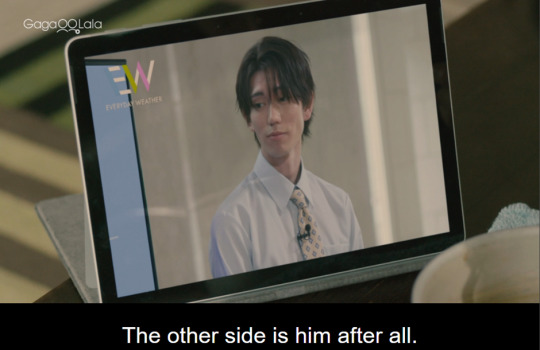
Y: 釣り合うわけないじゃん Y: 相手はよりによって これだぞ これ Y: There's no way (I) can match up (to him) Y: To this (person), of all people, this!
Ep 5 is about Yoh struggling with his desire to "match up" to Segasaki, and the objective difference that he sees between the two of them. It's different from Ep 2's struggle - which arose chiefly because he felt insecure about where he stood with Segasaki. This time, Yoh's struggle is predominantly with himself - because now he has to face up to his worst fear confirmed - that maybe he really is incompetent. And this time, he has to do it without the aid of alcohol too.
I've seen a lot of people talk about how Segasaki shows Yoh his love in every way but in words, and that that's the reason for their miscommunication - but that's not true. He may not use the word "love" or "like", but culturally these words are not often used anyway. What Segasaki does say however, multiple times throughout the show in fact but most clearly in this episode, is essentially "I like it when you depend on me". It's as direct a reassurance as you can get to the fear of being hated because of his perceived incompetence - but that's just the thing - Yoh's perception is skewed by his self-judgement. So, it's not that Segasaki can't use his words - the problem is that Yoh isn't ready to listen yet. Despite this, Yoh's confidence in his relationship with Segasaki is growing every episode. He might not realize this consciously, but it's right after Segasaki comforts and cares for Yoh at his lowest, that Yoh also drops to what is arguably the most casual speech level he's ever gotten with Segasaki (thus far) - and in response, so does Segasaki.
So, same translation disclaimer applies, Ep 5, let's go! (no twitter space for EP 5 probably because of the fan meets).
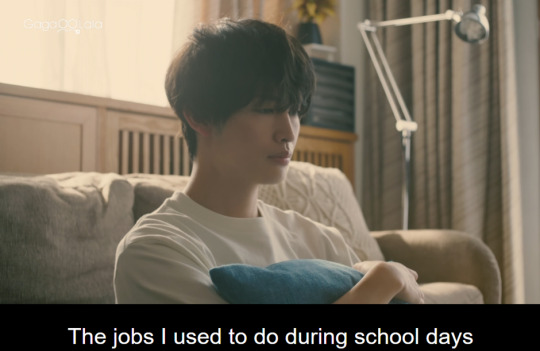
Y: 学生時代から不定期でもらってた単発の仕事も途切れて Y: 完全無職だ Y: あ、せめて、家事ぐらいはちゃんとやらないと Y: Now that the one-off jobs I've been receiving on an irregular basis since I was a student have been cut off Y: I'm completely jobless Y: Ah! At the very least, I have to do something as small as the housework properly.
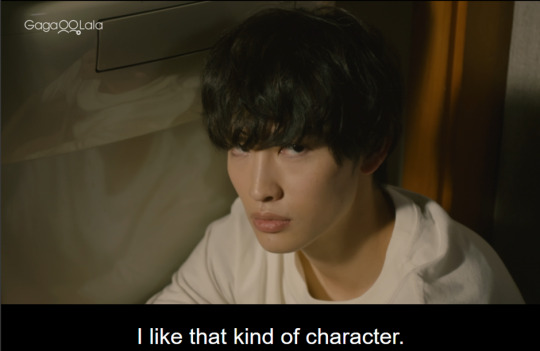
Y: だって そういうのがすきなんだよ、俺は Y: But, actually, that's what I like Yoh's explicit use of the personal pronoun "I" here again emphasizes that this is his own opinion. The way this sentence is phrased also gives the impression that Yoh feels a little aggrieved at the whole "your male characters are irritating to male readers because they're too perfect" explanation his editor gave him.
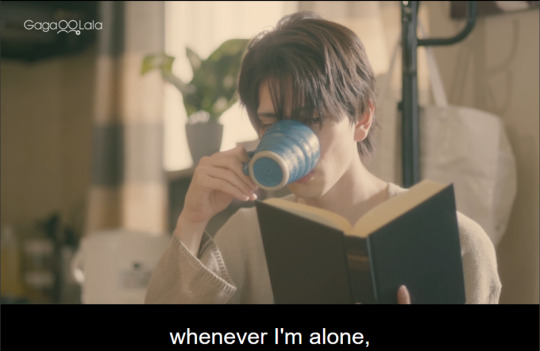
Y: *そりゃ、ほっといたら描いちゃうよ Y: **お前のせいだ Y: お前みたいなのが ***近くにいるから Y: バーカ Y: *Well I mean, if I'm left to my own devices then I'll end up drawing (him) Y: It's all your** fault Y: It's because someone like you, is (always) around*** me Y: I~diot. *The "aggrieved" feeling is even stronger in this sentence - Yoh is basically saying that he doesn't set out to draw the characters that way - it just sort of happens, and well it's not his fault, because as long as no one (including he himself) is paying attention to what he's drawing, well then, the characters just turn out that way. ** This is the first time that Yoh has referred to Segasaki using the informal pronoun "お前 (omae)" for "you". Depending on the context, it could be considered a rude pronoun, but is mostly just seen as a marker of masculine speech, and thus leans more towards being simply "impolite". It's the same pronoun that Segasaki uses when he speaks to Yoh - but Yoh usually uses the slightly more polite "あんた(anta)" instead, both in his head as well as when he speaks aloud. The switch here emphasizes Yoh's accusation, that this is all Segasaki's fault. ***the phrase here is often used to say that someone is "by your side" or "here for you" and doesn't only refer to physical distance. So, although he's using "omae" and "blaming" Segasaki for his characters turning out looking perfect, these 4 lines actually still sound pretty intimate. Together with how he drags out the word "idiot", this is very clearly Yoh's amae, similar to what we saw in Ep 4. I... will probably write a post about amae as well, because it's so important to their relationship.
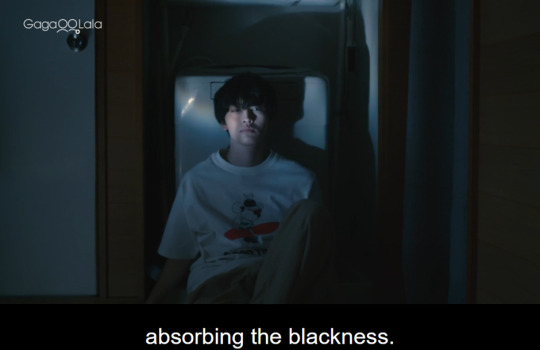
Y: 洋服を着たまま海に溺れるように Y: 暗いものが染み込んで Y: 黒いものを吸い込んで Y: ブヨブヨになった体はずっしりと Y: 重く 重く。。。 Y: It feels as if I'm drowning in the ocean whilst fully dressed Y: The darkness seeping into (me) Y: The blackness pouring into (my mouth) Y: My body, now swollen, sinks heavily down Y: So heavy. So heavy.
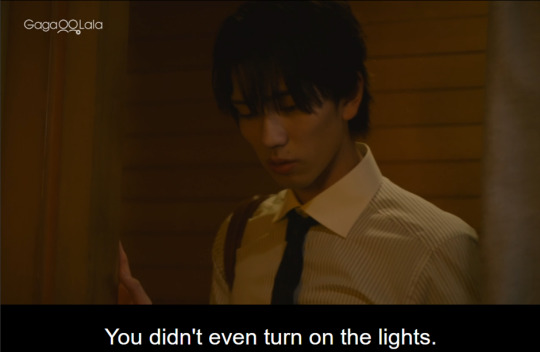
S: なんだ いるじゃねぇか S: 電気も付けねぇで 何やっ S: Oh so you are here S: Not even switching on the lights, what were-
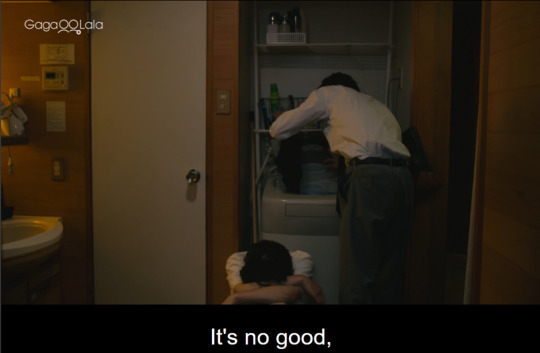
S: *あちゃ~ これやり直しだな S: *Ahchaa... This needs to be redone then..
*This is just a sound that you make similar to "oh man..." so I'm not sure why it was translated so forcefully as "it's no good"😅 This sentence is another example of soliloquy, or talking to oneself aloud, that is common in Japanese.
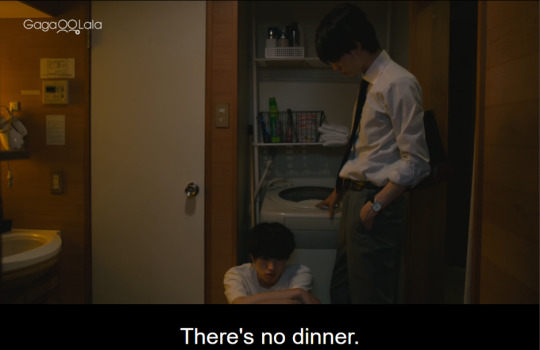
Y: ご飯、ない Y: ごめんなさい Y: すぐ準備する S: *しょうがねぇなぁ ほら立て S: 行くぞ Y: Food... there isn't any Y: I'm sorry Y: I'll make it soon S: *What do I do with you... come on stand up S: We're going
Yoh is really down here because he loses practically all his words. His first sentence is literally "food, none", and when he says I'm sorry he uses the casual (but full) version "gomen nasai" instead of "suimasen" like he usually does. It makes him sound a lot younger than usual, and overall just adds to the kicked-puppy vibe really well. *しょうがねぇなぁ (shouganee naa) - this is a common phrase that literally translates to "there is no way (to deal with this)" or more commonly "(this situation) can't be helped". It's used to express a sort of acceptance, like in a "oh well, it can't be helped, so don't feel too bad" or "well there's no way this could've been avoided, so let's just get on with it" sorta way. Here, the way Segasaki adds "naa" at the end with a rising tone, actually makes it sound a little indulgent - like when you find your puppy made a mess but it's too cute for you to feel upset and you just love it more. (Also, this is a really common way to show affection between characters in dramas/anime - when one character is down in the dumps, another will be like "well what am I going to do with an idiot like you, I guess I have to help, right?")
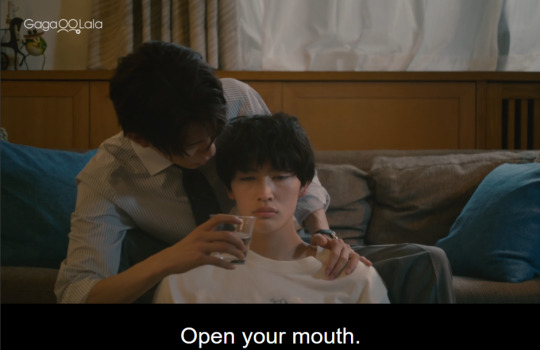
S: 葉 とりあえず 口開けろ S: Yoh. In any case, open your mouth first
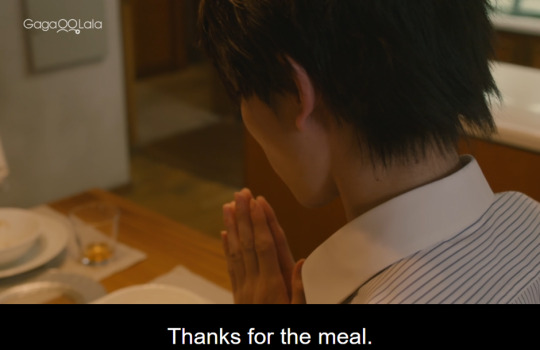
S: ごちそうさまでした (gochisousama deshita) S: Thank you for the food This is a standard phrase said at the end of a meal (it's counterpart is "itadakimasu - I gratefully partake" said at the beginning). It expresses gratitude to everyone involved in making the meal possible - from the farmers who grew the vegetables to the person who cooked the meal, and yes, even to the animals themselves. Usually, you would say this to the person who made the meal, or the one treating you to it, but it's Segasaki here who leads the saying of this phrase. This isn't weird at all, given the broad meaning of the word, but it is reminiscent of what a parent would do at home, or a teacher would do in school (Japanese teachers eat with their students in class).
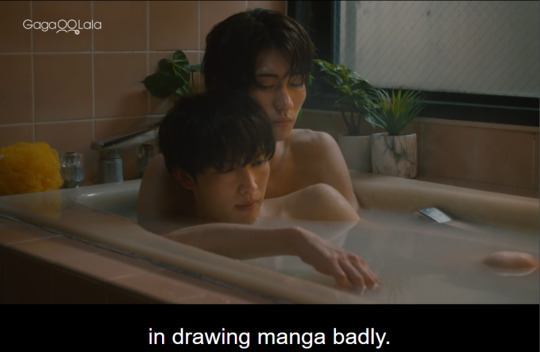
S: なんか落ち込んでんの? Y: 漫画が とてもだめです* S: You seem a little down about something? Y: My manga is... really bad.* *desu form is back, to give emphasis to this sentence. That said - and I'm really not trying to belittle Yoh here - but similar to the "food, none" phrase earlier, this sentence is just so short and simple that it just makes him sound, well, young. Imagine asking someone "you don't seem to like that person?", and they look at you all serious and say "they're a bad person" - it just sounds unexpectedly young and innocent, and the whole "desu" at the end just tops off the kicked puppy vibes for real. It's why Segasaki snorts a little and smiles.
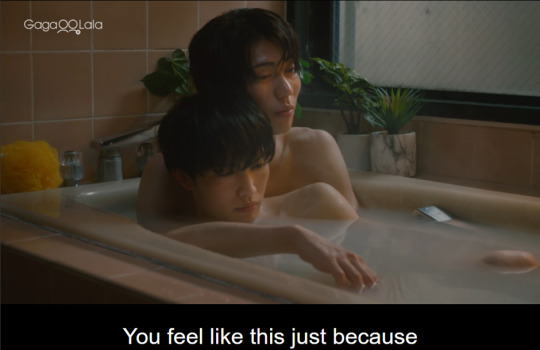
S: お前漫画がだめだと こうなんの? S: えっ そんだけ? Y: うん S: ふーん Y: そんだけってなんだよ Y: こっちは 今にも 死にそうな気分なのに
S: So when your manga is bad you become like this? S: Eh? That's all? Y: Mm. S: Hmm~ Y: What do you mean "that's all?" Y: When here I am feeling like I'm about to die soon In case you were wondering, "that's all?" in Japanese sounds exactly as it does in English, so no blaming Yoh here for being all 😟 about it.
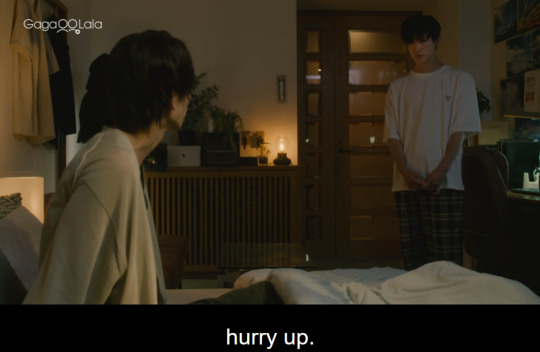
S: ほら* 早く来い S: Now, come here, quickly. *ほら (hora) - I last highlighted this word in Ep 3, but Segasaki actually uses it a lot more that just these 2 instances (not least because Yoh's always avoiding him). It's simply a word used to get the listener's attention, like, "look here" or "now" or "see" or "come on" etc.
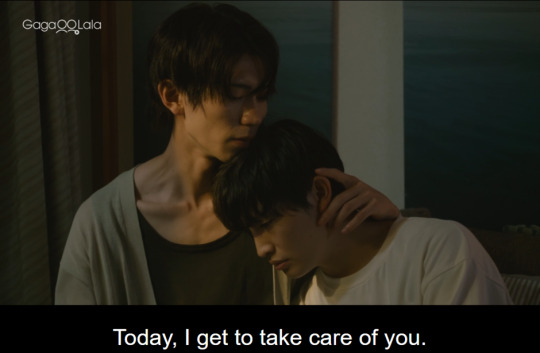
S: 今日はお前がされるがまま*で気分よかったわ S: もっと落ち込め S: Today you did exactly as you were told, so I felt really good S: Be dejected more often *されるがまま - this phrase means to passively go along with whatever the other person says or does to you, without any resistance (it can also refer to letting nature take its course). It's mostly used to describe a negative situation since it usually implies that the person has no free will of their own, but can also be fairly neutral as in "I followed the waiter's recommendations exactly". So, it's quite amusing that in these 2 sentences, negative sounding words are actually meant to be really sweet (just like how Yoh's "I hate you" sounds eh?).
Personally, I also appreciate how this is a callback to Yoh's monologue in Ep 3, when he talks about noticing the way Segasaki looks just that little bit happier when Yoh listens to him. Here, Segasaki confirms it for Yoh (and us), reinforcing to Yoh that he really doesn't mind Yoh depending on him one bit.
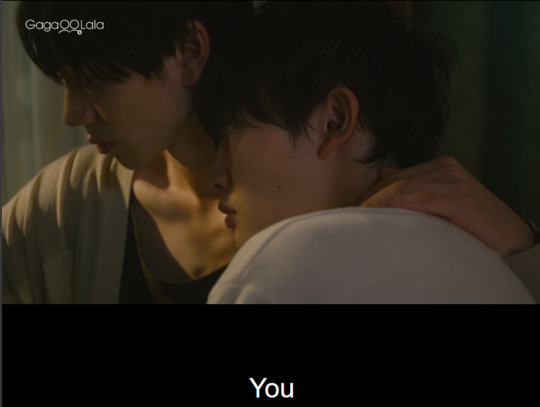
Y: こんなの本物の恋人同士みたいだ Y: あんた* まるで本当に 俺のこと好きみたいじゃん Y: Like this... it feels like we're a real live couple Y: You*... it's as if you really do like me *We're back to Yoh's usual "anta" here for "you", instead of the "omae" he used earlier.
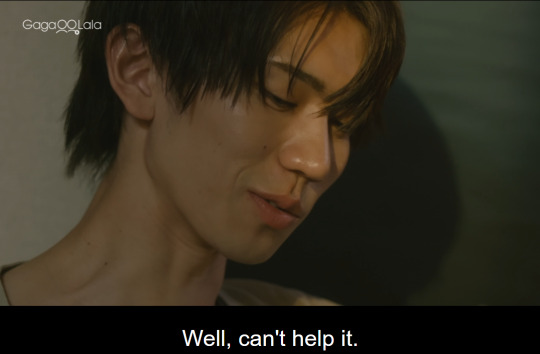
S: しょうがねぇなぁ S: What do I do with you This is the same phrase as earlier, when Segasaki found Yoh by the laundry machine.

Oh, the moon is beautiful isn't it? 🤭🤭
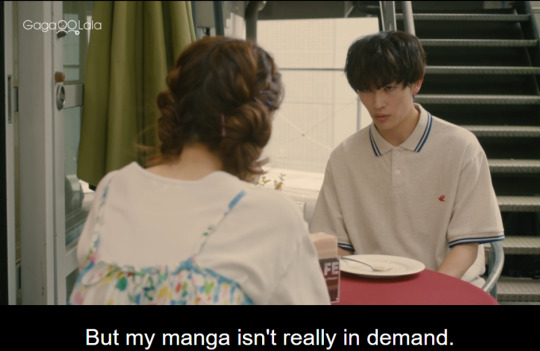
Y: だって 俺の漫画は世間に求められてないわけですし Y: But, it seems like the world doesn't want my manga... The phrase "the world wants/doesn't want" is commonly used when talking about finding one's place in the world/society, and young adults often say this when trying to figure their life out. So yes, not so uncommon a phrase that this sentence sounds ridiculous, but it definitely does sound a little dramatic. Hence Man-san's response.
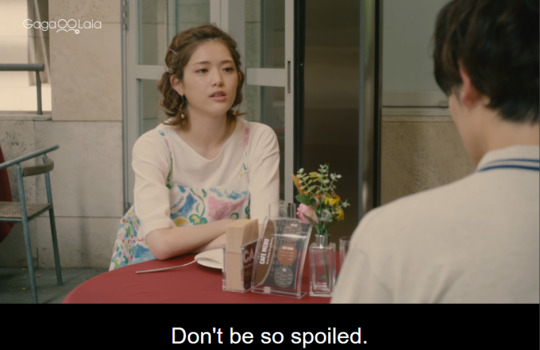
M: *甘ったれんな 思い上がんな M: Don't be so *spoiled. Don't think so highly of yourself. *The is the same word, amae, that Man-san used in Ep 4 when she said Yoh was being affectionate with Segasaki. This is another meaning of amae, and it is used in a negative way here, which sort of shows you the complexity of this concept. Underlying it is the message that it's okay to be dependent on your loved ones for your emotional needs, but you still need to take responsibility for your own life.
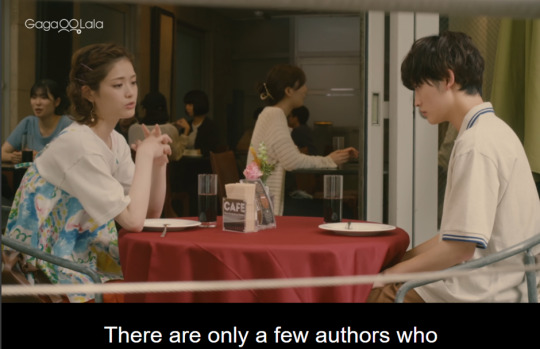
M: 衣食住の保障された環境でのんびり描いてて M: 一回仕事が途切れたぐらいでうじうじ言ってんのか M: 本気で気に食わない Y: 万さん オーバーキルです M: Being able to draw freely without having to worry about your clothes, food or lodging M: and yet acting all wishy-washy the moment something as small as getting your work cut off just once happens M: I really can't stand that Y: Man-san, that's overkill The term Man-san uses to describe Yoh's current living arrangement is the same term that Segasaki used in his not-proposal, so this suggests that by now Yoh has told her everything about how they got together (and I love that Man-san totally does not judge). It's not explicitly talked about in the show, but despite their similar status as Segasaki Otakus, Man-san does often come across as something like a mentor figure to Yoh, or at least someone senior to him in the Manga world. For one, she speaks very casually to him (for a lady, she sounds as rough as Segasaki tbh 😅), even for someone from the Kansai region, and she often gives him advice. Yoh usually speaks to her informally, but in this whole conversation he does shift up to the desu/masu form often, in response to her scolding him, because she's really going at it (even after taking into account her usual speech pattern😅) and well, he's smarting a little at the moment 😂
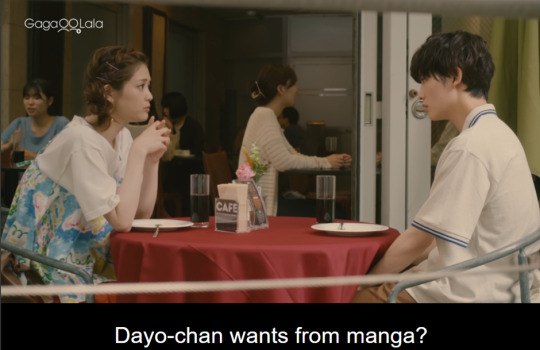
M: 世間がどうとかじゃなくて ダヨちゃんはどうしたいの? Y: え? M: ダヨちゃんにとって 漫画って そういうもんだったの? M: もうちょっと落ち着いて 考えな M: Rather than thinking about what the world wants, what do you, Dayo-chan, want to do? Y: Huh? M: Is that all that manga is to you, Dayo-chan? M: Calm down a little more and think about it yea?
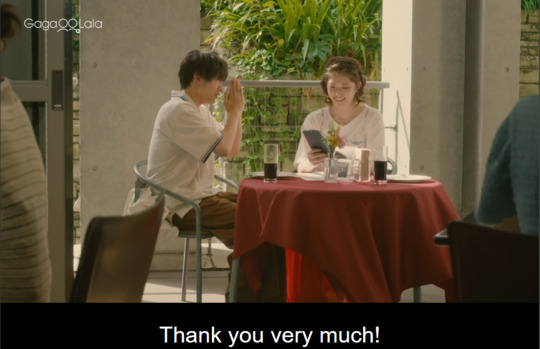
Y: かたじけのうございます Y: I am indebted to you! This is a very very archaic way to say thank you, think like samurai-level archaic. These two definitely live in the world of manga 😂😂
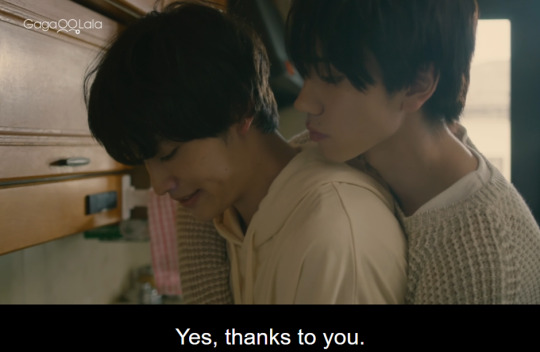
S: もう体調は戻ったのか? Y: はい おかげさまで* S: また 崩してくれても**いいんだぞ Y: ええ? S: Have you recovered now? Y: Yes, thanks to you* S: It's okay to feel down again for me** too you know Y: Eh?? *Okagesamade - standard phrase you use when someone asks after your health, or when you want to express gratitude for someone else's role in your success/improvement/recovery etc ** 崩してくれて (kuzushite kurete)" - adding "kurete" at the end like this literally means that Yoh does the action of feeling down for Segasaki, rather than just "it's okay to feel down again", which is why Yoh responds in such a surprised manner. As he did before, Segasaki takes what normally is a bad thing and talks about it like it's something good instead. It's his way of emphasizing that Yoh depending on him isn't an inconvenience, in fact, it's something that Segasaki is happy to be on the receiving end of.
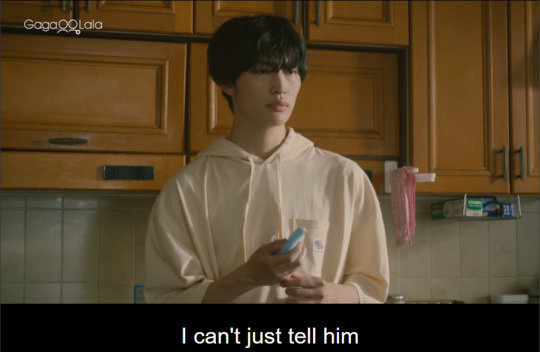
Y: これから自分たちをモデルにした漫画を描きに行きますなんて言えないし Y: そもそも、万さんのところにしばらく通うことを許してくれるかどうか。。。 Y: なんとか説得しないと Y: It's not like I can just say "from now on I will be going (out) to draw a manga based on us!" or something like that and... Y: In the first place, (I don't know) whether or not he'll allow me to go to Man-san's place regularly during this period... Y: I have to find some way convince him.
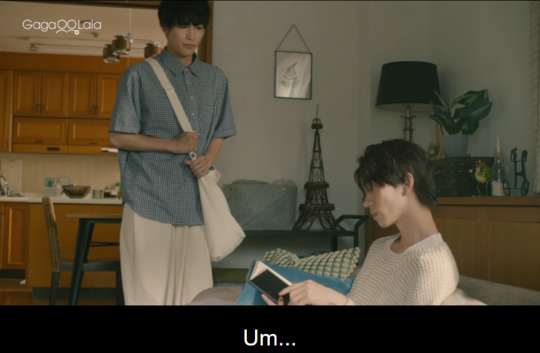
Argument breakdown time, things get intense~~
Y: あの。。。 S: ん? Y: 今日 編集部で打ち合わせをすることになった* Y: Um... S: Hm? Y: Today, I have a meeting at the editorial department* *Literally, "It has been decided that today (I) will be having a meeting at the editorial department" - this might sound like an indirect way to say "I am going to a meeting" but it's pretty par for the course when speaking politely. Except, Yoh doesn't use the polite form here like he did in Ep 4, nor does he phrase this sentence as an explanation that he's going to follow up on. Nope, by Yoh's usual standards, this is An Announcement, so it's no wonder Segasaki is immediately suspicious.
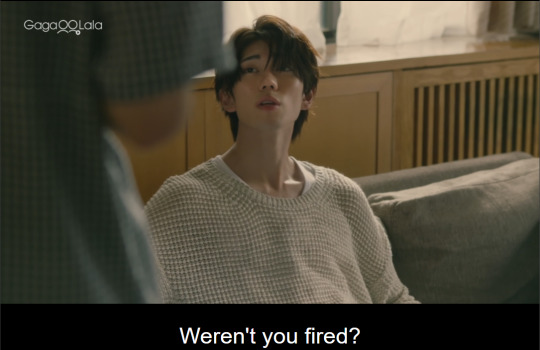
S: はあ? 仕事切られたんじゃねえのかよ? Y: いや そ、その。。。新しいやつ Y: しばらく 忙しくて Y: 場合によっては編集部に泊まりもあるかも S: 昨日の今日で そんなことあるか? Y: たまたま連絡がきたんだよね S: お前 なんか 俺に嘘ついてない? Y: う、嘘じゃない S: いや おかしいだろ 泊りって S: お前 まさか変な仕事じゃねぇだろうな? Y: そんなこと。。。ないよ! S: Haa? Didn't they stop giving you work? [じゃねえのかよ - Segasaki slurs the end vowel here, and adds the end particle "かよ(ka yo)" at the end, which is a rough way to express doubt or surprise, and usually implies some irritation. This, combined with Segasaki's trademark annoyed "haa?" results immediately in a rather flustered Yoh, who stutters a little on the next sentence] Y: No, it-it's... this is a new one. Y: For a while, I'm going to be busy and Y: Depending on the situation, staying overnight at the editorial department... might... be... necessary... [No end particles here - this is still a statement, and would sound stronger if not for the fact that he's hesistating so much] S: And all that just happens today, on this day, just one day after yesterday? Y: ...It just so happened that they contacted me, you see... S: You... are lying to me, aren't you? Y: I-it's not a lie! S: No, it's weird isn't it, to stay overnight? S: You - don't tell me - you aren't doing some kind of shady job are you? Y: There's nothing... of that sort!
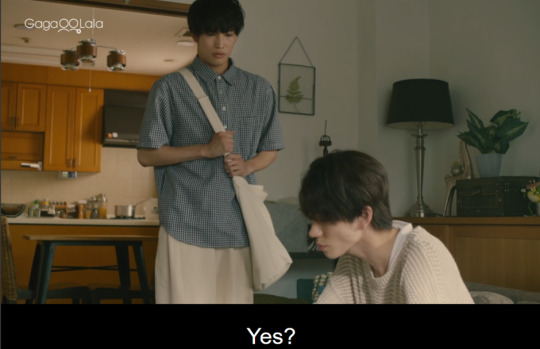
S: 葉 Y: はい S: Yoh Y: Yes (hai)?
Yoh's been making a valiant effort to stick to his story throughout this whole conversation but his tone changes completely and he pretty much gives up once Segasaki points out he's lying. In response - and this is not easy to hear but if you want to, go back to about 19:56 or 19:57 of this episode - do you hear Segasaki's small "tsk", after his sigh and before he says Yoh's name? Clicking your tongue, or "tsk-ing" someone is a very very rude way to express frustration or anger in Japan. We're talking get-into-drunk-fights level of rude, if you do it to a stranger. Amongst close friends and family, you're more likely to draw shock first, since it shows the depth of your anger, but they might still get pissed with you afterward. Here at least, Yoh can tell both from the tsk and Segasaki's tone of voice, that he is Not Happy, so he answers Segasaki with a proper "hai" here too.

S: ちょっとここ座れ* Y: はい S: 早く S: Come sit here* Y: Yes S: Be quick. *Slurred "r" on the word "suware" - sit makes this sound very very rough. Segasaki doesn't normally do this, so again, this is him angry, and he's going to slur his r's quite a bit more.
S: お前さ 自分の立場わかってんの? S: 分かってねぇだろ 分かってねぇから 泊りで仕事とか言い出すんだろうが Y: え~っとだから 遊びに行くわけじゃないし。。。 S: そうじゃねぇだろ S: ああ~もう S: 金か?なんか欲しいもんがあるなら買ってやる Y: 違くて 少しはさ。。。 Y: 自分が稼がないとって S: 必要ない なんで分かんねぇかな S: お前は稼がなくていいんだよ S: Listen, you - do you even understand what position you're in? S: You don't do you? You don't understand and that's why you can just say things like you'll stay out to work overnight. [This is harsh. Not only is the speech rough, he's still slurring some of his "r"s here, and the ending particle だろうが emphasizes the forcefulness of this statement and Segasaki's frustration - and you can see the effect it has on Yoh.] Y: Umm well... it's not like I'm going for fun or something... [This is indignant, but also nervous - Yoh's speaking a lot faster than usual, and he has to drag the filler words at the beginning out before he can figure out what to say.] S: That's not what I'm talking about is it! [slurred r again] S: Argh I swear - S: Is it money? If there's something you want then I'll buy it for you [more slurred "r"s] Y: That's not it! Even just a little - [This is the first time Yoh uses the end particle "さ (sa)", and just like Segasaki, he's using it to draw attention to what he's saying, essentially the equivalent of "listen!". This whole line isn't rude, but it is direct and it's probably the most forceful Yoh has gotten with Segasaki so far, even compared to their argument in Ep 2 - Yoh might have physically pushed Segasaki then, but he mostly just sounded hurt. Here, he's very tense, but he's cut off by Segasaki biting his ear.] Y: - I should earn some money myself (at least, I thought so) [This is more like how Yoh usually voices his opinion - by "hedging" his sentences a little with "I think" and so on to sound less direct - though he's still using truncated forms here, so he's not quite back to his usual level yet] S: There's no need to. [To self:] Why don't you understand? S: It's fine even if you don't earn anything. [Similarly, Segasaki softens this sentence just a tiny bit by tacking on a よ(yo) at the end]
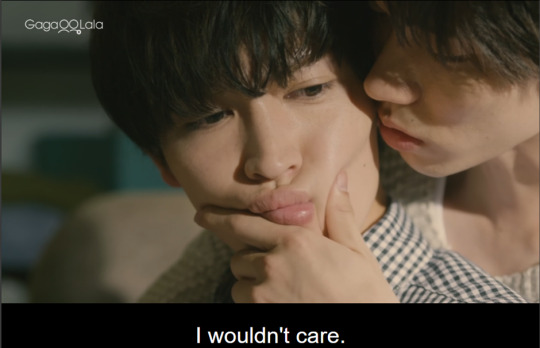
Y: でも! S: あのな 俺はお前に漫画の仕事がなくなろうがどうでもいいんだ Y: But! S: Listen to me. I don't care at all whether you lose your manga work or not. [To be fair to Yoh, the phrase "どうでもいいんだ" literally means "it's fine either way" but it tends to feel like "I don't care because it doesn't matter/make a difference to me/doesn't really involve me", so you can see why it triggers him.]
It's interesting to contrast Yoh's reaction here with the above 2 times Segasaki says something with a negative connotation. Of course, Segasaki also sounded a lot sweeter then (though in his defence, he didn't have to worry about why Yoh might be trying to lie to him all of a sudden), but the biggest difference really is in Yoh's mindset.
Y: え? S: 当然だろ S: だから余計なこと*すんな Y: なんだよ どうでもいいって Y: 漫画のこと 分からないなりに 応援してくれてるもんだと思ってたのに Y: あんたにとってはくだらないことでも Y: 俺にとってはすごく Y: すごく大事な事なのに Y: 全然よくない Y: バカにすんなよ! Y: Huh? S: Isn't that obvious? S: So, don't do unnecessary* things [*余計なこと - This phrase is used to refer to the problems that arise from whatever thing/action is in excess, and so has a negative connotation. Yoh is too fixated on the previous line to notice though] Y: What's that (supposed to mean)... "I don't care" Y: I've always thought that manga was something you supported me in, despite not knowing much about it, and yet... Y: Even if to you, it's something trivial Y: To me, it's something that's extremely Y: It's something extremely important and yet... Y: This is definitely not ok Y: Don't look down on me! [word contraction - again, by Yoh's standards, at least when he talks out loud to Segasaki, this is a drop in speech levels]
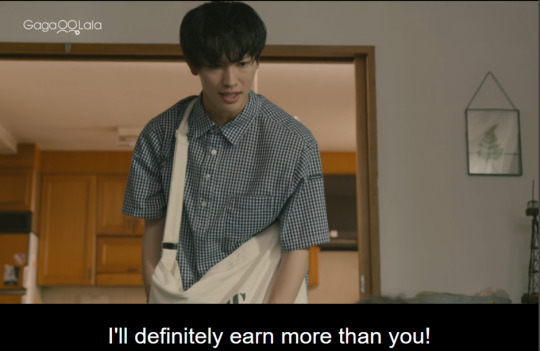
Y: 絶対あんたより稼げるようになってやる Y: 漫画で! Y: I'm definitely going to become someone who can earn more money than you! Y: With manga! I think difference between simply "earning more" and "becoming someone who can earn more" is important here - because it isn't about money - it's about competence. Yoh thinks his own worth is calculated in his ability to do things "well", be it in his work or at home. By that measure, Segasaki is worth everything and Yoh is sorely lacking, hence Yoh wants to "become" someone that is, in his mind, worth something. Because if he does not, then inevitably, Segasaki will one day come to disdain him.
There are so many times in this episode that Yoh hears things that should cement their relationship in his head, that he even recognizes as couple-like and accepts without protest - Man-san referring to Segasaki as Yoh's boyfriend, Segasaki losing his whole "man-of-a-few-words" thing and saying more to him in this episode than in any other, verbal confirmation that Yoh depending on him is something he welcomes etc. And yet, Yoh's fear filters all of that out and he hears only what sounds like his own self-judgement in Segasaki's voice. It's no wonder he lashes out at Segasaki like that, though really, who he's really attacking is himself. Afterall, sometimes when we hurt ourselves, we hurt the people who love us too, as we'll see in Ep 6.
(That was quite the arguement though, wasn't it!)
#my personal weatherman#taikan yohou#体感予報#MPW subtitle corrections#mytranslations#segasaki x yoh#segasaki definitely uses the wrong words sometimes#but it's not like he doesn't use the right ones either#until yoh acknowledges and believes in his own strengths#segasaki could promise to love yoh for all their natural lives and then some#and yoh would still fear that segasaki might hate him#sorry i just see so much discourse about how things could be solved if they just used words#but it's not about what is being said (or not)#it's about what is (and isn't) being heard
204 notes
·
View notes
Note
Hello!!! I love sm your hc/scenarios, they are SO GOOD!!!!
If it's not too much trouble, you could do an Obey Me scenario with the 7 brothers (separately obviously) with a fem (or gender neutral, if you prefer!) s/o who is pretty buff and what do they think about it?
I'm still kind of new to this game, so I don't really know about events or storyline😭😭 so do as you wish or which one would best fit in this situation!!

COMMENTS: Hi! Thank you! I'm glad you enjoy them so much 😊
I found your request interesting. I decided to write with a Fem Reader because a muscular body is seen differently if it is a man or a woman. As I don't have that type of body, it's difficult for me to think of a scenario, that's why I ended up doing headcanons.
I hope you and all enjoy it 💪
P.S.: You said you're new to the game. Welcome! I hope you enjoy your stay. 😈
CHARACTERS: Demon Brothers (Lucifer; Mammon; Leviathan; Satan; Asmodeus; Beelzebub & Belphegor)
TAGS: Fluff; Fem Reader; Comfort; Bullet Points
WORD COUNT: An average of 250 words per character.

CONTEXT: From the conversations in the game I assume that Beelzebub works out at home, so I also wrote thinking that MC would also work out at home and not in a gym.

Lucifer is very proud of you, BUT he still has his own pride as the man in the relationship.
Even with his brothers he likes to be the strongest, out of pride and to protect those he loves most. Things wouldn't be any different with you.
He doesn't want you to be weaker, he just wants to be stronger than you. He wants you to depend on Him and not vice versa, especially in matters of strength and power.
He will be happy to join you in your workout. In addition to spending more time with you, he also takes the opportunity to see how your workout is and set an even harder for himself without you knowing.
You'll never know how hard he works to remain the strongest in the family (which includes you). From him, you will only hear how proud he is of you, perhaps a similar pride to what he feels for Beel in a way.
That and provocative phrases to compete in some way to see that he is still the strong-... I mean to see who would win.
If anyone even has the audacity to insinuate that women are not beautiful with muscles, he will step in and use all his intimidation skills to humiliate the demon to the point of them being ashamed of open their mouths ever again.

Mammon's feelings are conflicted. He loves you and is proud of you, BUT if you are as strong or stronger than him it will be a huge blow to his pride.
He knows he's not that smart, so he only had his strength to brag about. If he doesn't even have that, then what can he contribute to the relationship?
At first he will need you to reassure him, telling him why you love him and that it's not because he's strong... I mean, not just because of that...
After that he will become more confident and maybe join you in some workouts.
One day, he might even consider the idea of helping you open a gym so you can both earn a lot of money. But then he will think of you as a personal trainer for some other demon and his jealousy will win and he will discard this idea completely.
If he becomes too comfortable with the idea of you being so strong, he will try to convince you to be his bodyguard. Mainly for the times when someone is after him to get their money back.
If someone insinuates that women are not beautiful with muscles, he will step in and incite a fight with the person who said it. And because it was about you he will use all his strength if necessary to shut up anyone who wants to try and say something like that again. He will make sure he wins all these fights. And if you help him, honestly, so much the better.

Levi never cared about being strong. But in your case, that's just another quality of yours for him to worship- I mean love. You are the knight in shining armor that he so admires.
Whenever you need it, he will tell you how wonderful you are and how incredible your body is. In a respectful way of course. The downside is that now he'll have something else to self-deprecate about.
He won't join you in the workout, sorry. But if you turn your workout into a game, maybe he'll consider it. But not in a PvP game, okay? He knows he can't win against you and even if he could he doesn't want to fight you.
He will ask you, without any shame, to open something that requires strength. And tell you how incredible you are right after.
If there is a couple that you both would like to cosplay and the man is the strong one, Levi will have absolutely no problem, and he may even be the one to suggest that you cosplay the characters but swapped. Or even change the genders of the characters. He will love doing couple cosplay with you no matter what.
If someone insinuates that women are not beautiful with muscles, he will step in like the simp- I mean stan he is, and start with that speech of an emotional fan defending the character he loves most without any hesitation. The demon who dared to say that will have to deal with his burning passion to the point of being like "O-okay, I’m sorry! Chill man...”

Satan always gave more importance to intelligence than strength. But if you have both, so much the better.
Your muscles don't bother him, at best they impress him. How could he not be impressed by your hard work? As long as you still have time to enjoy a book with him, he's just proud of you.
In general, he wouldn't treat you any differently. He would treat you the same no matter what you look like because what he loves is your inside, what you look like on the outside is just a beautiful cover of an amazing book, no matter the edition.
He wouldn't join you in the workout, sorry. Unless it's some kind of race after a cat or a competition with Lucifer to wipe the smug off his face, he'd rather sit and read a book.
However, there is a good chance that he will read books related to physical exercise to help you improve your workout. Or food books to recommend new recipes for dishes or drinks if this also helps you.
If anyone even has the audacity to insinuate that women are not beautiful with muscles, he will step in, probably in his demon form because he will be furious. No one talks bad about you in front of him! Whoever said that will be reminded why they should be afraid of the Avatar of Wrath.

Asmo will keep telling you how beautiful you are, like he always does and always will.
There are so many styles of clothes he can try on you that would look so good on your body type! You'll love it, you'll see!
He is already Princess Asmo and you will now be his knight in shining armor. This would probably describe your relationship pretty well.
He wouldn't join you in the workout, sorry. Your exercises are probably too hard and heavy for the type of body he prefers to have. Oh, but he LOVES watching you train. It's so hot!
He will definitely join you to eat. And if you start a diet or improve the one you already have, he will join you. If it's not a specific one for those who work out a lot.
He will also love taking photos with you and suggest that you take photos of you working out. They tend to be very trendy on Devilgram. And those photos from you? Everyone would love you even more! And Asmo would probably create some kind of album to feast his eyes on.
But he also has another, more protective side. From time to time he will ask if your exercises are not too demanding. You know, you shouldn't be so demanding on yourself, you can get hurt if you don't take it easy sometimes.
If someone insinuates that women are not beautiful with muscles, he will step in, with an aura that is both rare and intimidating. He will react to someone saying you are less than gorgeous the same way he reacts when someone insinuates the same about himself.

Beel and you are two beans in a pod, and that is awesome! One of the people he loves most can work out with him! What's there not to love about it?
There's a good chance you two will ask Lucifer to turn some spare room into an exercise room. And the same good chances of Lucifer authorizing it. This will become your special place and you would probably decorate it as such. Needless to say, Beel's brothers will start to get jealous.
Matching gym equipment and clothes!
Your walks in the park are jogs together. And there's a good chance this jog will end in a picnic in the park.
More jealousy from his brothers. Which will probably make all of them, except Lucifer and Belphie (Belphie is never jealous of Beel), suddenly have a huge desire to start working out too and join you. Beel will be extremely happy about this but they won't last much longer than a day. However, Beel will be happy that at least for one day he worked out with his family. And the others will be happy that he was happy. So, everyone ends up happy in the end and the jealousy ends up disappearing.
You will cook and make smoothies for both you and him. Otherwise he ends up eating everything before it's ready.
If someone says that women are not beautiful with muscles, he will step with that extremely rare angry aura, like when he's been hungry for too long and is capable of going on a rampage. In an imposing pose in front of the demon that insulted you to the point that they were covered by Beel's shadow.

It is undeniable to say that his twin brother is the brother that Belphie loves most. And now you have even more things in common with him! He absolutely loves you!
Needless to say, he won't be joining you for a workout. But he will support you in whatever way he can like he does with Beel.
He will be the person who tries to convince you the most to go down the wrong path. Not because he wants you to stop working out, but because he likes being lazy with you. He already does this normally but as you take time out of your day to work out, you can feel him being more pampered.
That or try to convince you to do something for him. Or instead of him. You are so much stronger and more athletic than him. It's so much easier for you to do household chores. Are you sure you can't do that little favor for him this time?
If someone insinuates that women are not beautiful with muscles, he will "nicely" give the demon an opportunity to apologize. If not, he'll just be one more nasty comment away from taking on his demon form and strangling the demon who dared to insult you.

If you dropped in here out of the blue and want to read more from me, you can find it in my pinned post: INDEX
#1000 followers#1K followers#1000 followers milestone#1K followers milestone#1000 followers celebration#1K followers celebration#Obey Me#obey me shall we date#obey me imagines#obey me one master to rule them all#obey me fluff#obey me x reader#obey me headcanons#obey me requests#requests#obey me Lucifer#obey me Lucifer x Reader#obey me Mammon#obey me Mammon x Reader#obey me Leviathan#obey me Leviathan x Reader#obey me Levi#obey me Levi x Reader#obey me Satan#obey me Satan x Reader#obey me Asmodeus#obey me Asmodeus x Reader#obey me Asmo#obey me Asmo x Reader#obey me Beelzebub
135 notes
·
View notes
Text
They're both wrong.
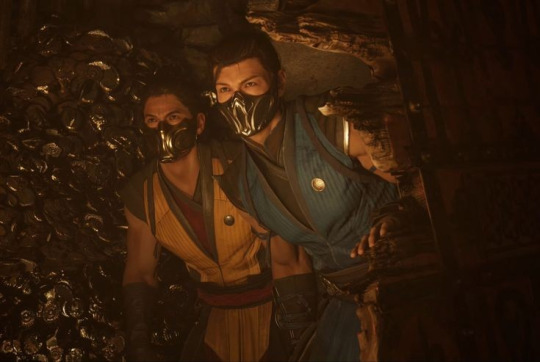
Hi. Recently, we often see different opinions about Kuai and Bi Han in this new relaunch (another one, my God). It's incredibly nice to see people who are really trying to look at what is happening from all sides, but guys - our attempts are in vain, because this game is a damn dummy. Some blame Bi Han, others blame Kuai, and everyone is right in their own way, but what if... THEY'RE BOTH WRONG.
To begin with, the game clearly marks its favorites and does not even try to pretend at least some intrigue and depth. Let's be honest, dear ones, we knew from the very beginning that Bi Han would be treated dirty. The only thing missing was the banner "I'm a villain, guys" at his breast. Let's leave aside how it breaks the character to hell and disappoints. Let's look at what is happening objectively.
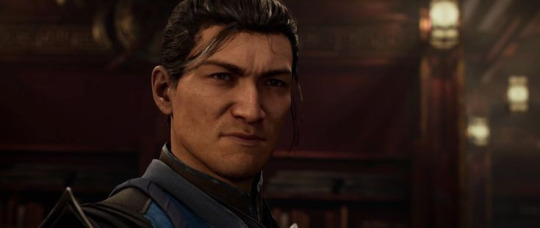
So, Bi Han is the head of his clan, who took this place after his father's death. According to Bi Han himself, he let their father die (somehow, and we probably won't know the details). What for? Because their father's vision limited the clan (we probably won't know the details either). Objectively, Bi Han had no need to somehow bring his father's death closer for the sake of power in the clan. Because - you know - Bi Han is the eldest son, he would have taken this place. Considering Kuai's words that there are enough people loyal to Bi Han in the clan, this means that it was not about power as such, but something else. Bi Han let his father die not for the sake of power for himself personally, but for the sake of the greatness of the clan (whatever that means, the game does not give explanations). This is not a selfish motive. At least, not in the direct understanding of this concept.
It seems that Bi Han is not interested in taking over the world completely. He says that he needs a part of the Earthrealm and nothing more. He... wants to build a state? This is a contradictory goal, but it has a place to be (and also our joke about him wanting to restore the Qing Empire turned out to be prophetic; we need to stop joking about it). From this we can draw a logical conclusion that it is not in his interests to betray the Earthrealm, to condone its destruction or subjugation to someone else. Because it literally contradicts his goals.
The next thing that fans hate him for is that it is he, Bi Han, who leaves his brother the his scar. We've seen claims that he tried to kill Kuai and... it's quite possible that he did. Emotions, rage push him forward, to attack. Bi Han is constantly angry, but especially in this scene. And if you review this scene, you will clearly see that Bi Han waited a VERY long time before Kuai noticed that the knife was in his other hand. This is really a decent slowdown, and Bi Han had the opportunity to kill his brother at the same moment. But he doesn't. His attack is an impulse, not a cold-blooded desire to kill Kuai.
Another reason to hate Bi Han is Smoke. More precisely, the fact that Bi Han - that's terrible! (sarcasm) - does not accept him as a brother, because Tomas is not his blood brother. Bi Han says that Tomas is not Lin Kuei by blood, and this moment raises questions. A clan is a social association that is based on blood ties. This is usually one or more families united by kinship of varying degrees. In the old chronology, it was never exactly said whether Lin Kuei was a clan, a united kinship. More often it seemed that these were conditional ties, more idealogical than blood ties. But here Bi Han puts a lot of emphasis on blood ties. So does this mean that Lin Kuei is still related to each other? This can also be regarded as the fact that Bi Han says that Tomas is not part of their family, and not the clan as a whole, and this is the case. Even people treat blood brothers and sisters differently, it all depends on the upbringing and the situation in the family. We don't know anything about the context, we don't know about the past, about the relationships of these people. Frankly speaking, they do not communicate with each other like real living people who, albeit conditionally, are part of the same family. All their dialogs can be replaced with:
Bi Han: the exposition. Kuai: the exposition. Tomas: the exposition. Bi Han: exposition and an unexpected plot twist. Kuai: the exposition. Some important phrase. Tomas: another exposition. Write me a check and I'll go to in a better movie. Bi Han and Kuai: we will also go to in a better movie, but first here's another exposition.
The only time one could truly believe that they were somehow connected to each other was when Bi Han asked if they were both unharmed. He just fought Ermak, a creature with thousands of souls, but it is he who asks Kuai and Tomas if they are okay. Not the other way around.
Another problem associated with this scene is that many people did not seem to be watching it with their eyes. We literally had to point out to our friends at this point. Damn stone. Reconsider, come on. Bi Han doesn't kick him, doesn't throw him down. He just ends up too abruptly on the edge of the wall and a piece of stone breaks down by accident. Bi Han doesn't want to kill Tomas. Bi Han doesn't want to kill Harumi either, for that matter. In that dialogue, he says that the family can be a means in this war. He doesn't say "I will kill your wife", he just said that he might consider influencing Kuai through something/someone else. Take Harumi hostage or influence her to influence her husband's decisions. Maybe just find a way to negotiate with her, because with Harumi, Bi Han doesn't have a family drama that seems to have been accumulating for years. People who accuse Bi Khan of something he didn't actually do, be ashamed, because this is slander.
Bi Han is still the antagonist. More precisely, he could be him, but his betrayal does not make any sense at all, either emotionally or in plot terms. He doesn't do anything else after it and disappears from the plot. He might as well have just been injured by Shang Tsung or by Quan Chi, and recovered in the hospital behind the scenes.
The problem is that the game doesn't want players to somehow empathize with Bi Han or even support his goals. And his goals (no matter how illusory they may be) have a place to be. He is ready to take extreme measures, radical decisions, but in fact he has not done any of this yet. The studio did not make him either a positive hero, a cool antagonist, an inspiring villain, or a neutral character with his own motives. He's just a piece of evil cardboard, against which Kuai should look as good as possible.
Is Bi Han right? We don't know. The game does not give any context and declares that he wants power for the sake of power, which is always as negative as possible, because the desire for power does not lead to good. Is he right to let his father die (whatever that means)? No. Without context, the answer is unequivocally "no". Is it cruel of him to be cold towards the orphan Tomas? Cruelly. But there is a place to be. Again, we lack at least some context. The game just says - hey guys, Bi Han is a villain now, condemn him for his villainies that we didn't even really come up with. Excellent solution, NRS writers, just excellent.
Summing up - Bi Han: 1) ambitious (which is not explained by anything) 2) cold with others 3) somehow involved in the death of his father 4) puts his clan above everything else and even above blood ties (although he himself refers to the importance of blood kinship and .. IT DOESN'T MAKE SENSE AT ALL)
In a number of dialogues, Bi Han is inconsistent, but let's remember that he is a person who will not tell the enemy the truth about his relationship with someone. So don't take at face value everything he says to other characters in the intro. He is still angry, but he still wants the brothers (Kuai for sure) to be on his side, although on his rules.
And now let's approach the situation from the other side. Kuai and Tomas. And we will immediately abandon Tomas, because - you know - he is not even a character in this farce. He's just a weak-willed appendage of Kuai, completely devoid of personality, and the script is completely to blame for this. Tomas had at least some problematic and self conflict in the old chronology, he literally lived with a demon in his head. Unfortunately, now he's just a dear friend of one of the main characters. He deserved more. Let's remember the wasted potential with a kind word. And let's move on.
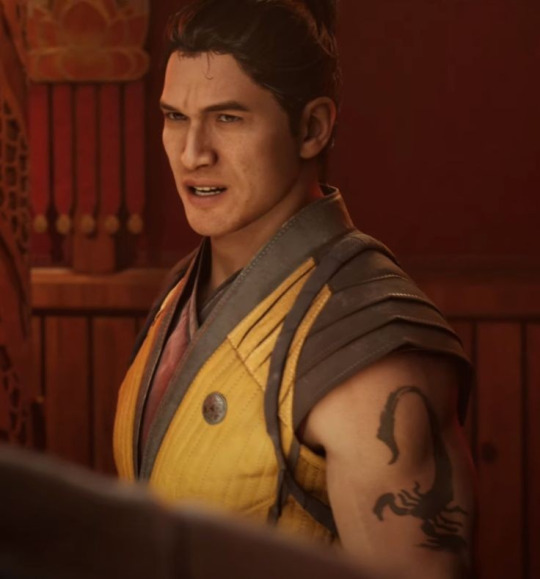
So, Kuai Liang. Let's not touch on the topic anymore that this is not really the Kuai we knew; that the studio also took away all his personality. This has been said many times. Let's look at it within the framework of this particular plot. He is the second/youngest son of Grandmaster Lin Kuei clan, and he probably has less chance of to rule the clan. From his official biography, it can be said that he was attached to his father because he grieved after his death. Again - we don't know anything about their relationship. Of course, the child's love for the parent is unconditional (but for some reason this does not apply to Bi Han), and it can be understood that Kuai is devastated by the death of his father. But there is no context here either. Were they really close? Or was Kuai's father a kind of idol, as for many children with rather cold parents? We don't know, because the game doesn't say anything else, except that the previous Grandmaster took the wounded orphan and raised him in a place where Tomas could see the people who killed his family every day. It's a very merciful decision, man, but let's not talk about it now.
Kuai follows his father's vision because he grew up thinking it was the right thing to do. And it makes sense. It is right for Kuai to guard the Earthrealm with the methods that his father instilled in him (perhaps because we again have no idea what was between them). He is quite young, with a hot heart and a hot head, so with all his sanity, feelings will often prevail in him. And this is normal for a living person. He is not as desperate for action as Bi Han, and is more passive at such moments, which can be explained both by the family situation and the nature of his character. Again - we don't have the context to judge for sure. And although some of his statements seem indifferent towards his brother, the game clearly does not imply that Kuai is a bad person or a bad brother. Although, of course, it is not perfect.
Understand correctly. This whole family - Bi Han, Kuai Liang and Tomas - is problematic. If you listen to some of their dialogues, look at their general behavior and logically understand what is happening, then a picture emerges when an unclear family problem has been growing for years, but all three have too little habit of talking about their feelings and trying to solve the problem with words, not a fight. But at the same time, the plot is desperately trying to make Kuai a positive character. And the most revealing scene here is Kuai's attack on his brother in the tomb. Let's take it in order, because a lot of people have problems with this scene too. 1) they are captured 2) Shang Tsung talks about his plan, trying to lure Lin Kuei to his side (and thus the heroes get information) 3) Bi Han silently makes it clear that he seems to agree to the sorcerer's terms (we remind them that they are still in captivity) 4) Bi Han says he let his father die 5) Kuai attacks and in a fit of rage tries to kill his brother, he does not succeed (and it is the intervention of another soldier that does not allow Kuai to make a mistake) 6) Kuai escapes
This scene is stupid and meaningless from beginning to end. Bi Han, whose goals are to control a part of the Earthrealm should least of all trust Shang Tsung. On the other hand, if he says no, nothing will stop the soldiers from cutting the throats of both brothers right here. The army of living statues is not some incredible tool at all, they burn and melt very well (as we have already seen). Why did Bi Han agree to this seriously? But what follows is a moment that is just confusing. Bi Han says that he let their father die (it is unclear what exactly he means), and Kuai attacks him without the slightest hesitation and delay with such fury that without outside interference he could have killed Bi Han. Yes, he is emotional, he is furious, he is in grief. To know that your own brother did this is just awful. But before that, Kuai is shown to be a calm and sane person who will think first and then do something. If he had remained the same as he was shown to us, he probably would have really doubted his brother's words. You know, if our brother had said that he was to blame for the death of our mother (as a person whose mother died, we can say so), we would have first thought if he had gone mad. Because in family relationships it is normal to believe in the best in your relatives. Did Kuai have doubts, suspicions? No, the game didn't show that. Again, we are not given any context. The plot wants us to just believe that Kuai is right to appeal to our conscience, because parricide is always bad (tell that to Tyrion Lannister, yes).
Kuai can be understood in his anger. Even if it happened that he accidentally killed his brother in a fit of rage, he would regret it. The game tries to pretend that he is a good person and that he really cares about his brother, even if he is absolutely crazy, but the plot doesn't even try. Kuai takes Bi Han out of the fortress so that he does not help Shang Tsung. This is exactly what Kuai himself says directly. He's probably a good brother (???) *bewilderment*.
Kuai is actually trying to be a good person. He is trying to restrain Bi Han's ardor, to support Tomas. He doesn't really want to fight, but he doesn't run away from battle either. The difference is how he solves his problems. Knowing that a paramilitary clan remains under the command of Bi Han, which may pose a threat, Kuai escapes. Again, we don't have the context to understand whether this decision is logical or infantile. We mean that he is the son of the previous Grandmaster who defeated the current Grandmaster in battle. He definitely has at least some weight in the clan. He could have just grabbed his brother and hammered some common sense into him, because - you know - lives depend on it. But the plot literally does not allow Kuai to act logically.
He's not a scoundrel. Not a traitor. He tries to follow what he thinks is right. He is the same person with his own goals as Bi Han. But the difference is that the plot exposes one of them as a villain, and the other as a pure and innocent hero. And such a sharp separation, which does not allow the characters to be interesting and lively, is frankly annoying.
By the way, Kuai is also inconsistent in the introduction. He clearly doesn't want anyone else to harm Bi Han, but he doesn't tell him about it. And it makes sense, because there's still this damn family drama between them that makes them both angry.
In the end, they are both wrong. They're both terribly scripted characters that the writers play like dolls. And it's not the fault of the characters, it's the fault of an absolutely immature plot. Don't blame them both, understand that this game just can't handle the disclosure of heroes and uses manipulative elements to hang labels.
We understand the frustration and the desire to find meaning where there is none. But, as they say in our country - do not stretched an owl on the globe (no need far-fetched facts).
This is a terribly manipulative immature plot that attracts attention only at the expense of the fanservice. Don't blame the characters, don't pour shit on them. Remember that they are hostages of the script.
The perplexed Kenshi, as the embodiment of our reaction to everything that is happening.
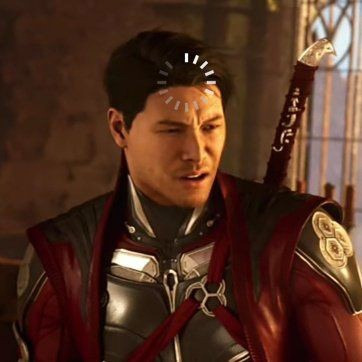
#bi han#kuai liang#tomas vrbada#mk#mortal kombat#mk1#sub zero#lin kuei#smoke#mk scorpion#scorpion#bi-han#mortal kombat fandom
158 notes
·
View notes
Text
Atari Guide
Y'know, for a number of reasons, I can't call this post "done." But also I've had this all written since before the Lidelle summary so... eh. Let's just post it and I can make an expanded post later down the line

Atari is an absolute disaster, in the best possible sense of the word.
General consensus puts her at the 18-20 age range. Her speech suggests someone fresh out of high school and lucky enough to land her dream career first try.
Said career being "spacetime detective." An encounter with one in her past (heavily implied to be Seo) inspired her to pursue that.
She seems to view detectives as heroes. They're the good guys that catch bad guys and help the civilians smile again by resolving their problems.
The cop dramas she watches probably have something to do with it.
In Japanese, "atari" means "tackle," "full force," "impact," "bullseye," "on-target," or "jackpot," depending on the context. Atari often takes advantage of that fact and puns accordingly.
These puns have more than once turned a self-introduction into a brief Who's On First sketch.
(God only knows how that's gonna be handled, if at all, should she ever have dialogue in a localized game.)
Matching with that tendency to make those kinds of puns, Atari is extremely eager and enthusiastic. When she decides on doing something, she'll go at it full-force.
(The downside to this is that once get gets her momentum, it's difficult to redirect her)
She's quite strong and athletic. Not on the scale of Rulue, but she can overcome whatever sort of gravitational pull a hole in space and time has, and can swim fast enough to match a shark.
Atari loves food. She has a ridiculous appetite and will start eating anything offered to her. And a lot of her thoughts tend to end up gravitating back to food sooner or later.
Her favorite is onigiri.
Atari is earnest, polite, and optimistic, but she's a bit of a space cadet. She tends to get details mixed up and act without planning or thinking.
Did I say she's a space cadet? I mean Atari is completely unhinged. Her untamed energy leads to her saying and/or doing things that are stupid yet hilarious.
Her verbal filter and volume control are highly questionable and her focus on the thoughts she gets is almost impossible to stop.
It's taken her a few reminders to not blurt anything out about knowing people she's met on different cases on different worlds.
Atari's gotten better at observation and deductive reasoning since she joined the STDA, even if she's still non-sequitur prone.
Appropriately enough, the more absurd the case, the better she is at solving it.
She's resourceful, and good at figuring out solutions to the immediate problem with the tools she has available.
She's pretty self-aware. Combined with her unchecked optimism, Atari is known to boast about her inability to perform a given task.
Her optimism isn't infalliable. Sometimes it borders on toxic in an especially bad situation.
Atari is easily impressed by the accomplishments of others, no matter how minor (or whether it was something she should have already been able to do). It drives her to push herself further.
Some bonus samples:



12 notes
·
View notes